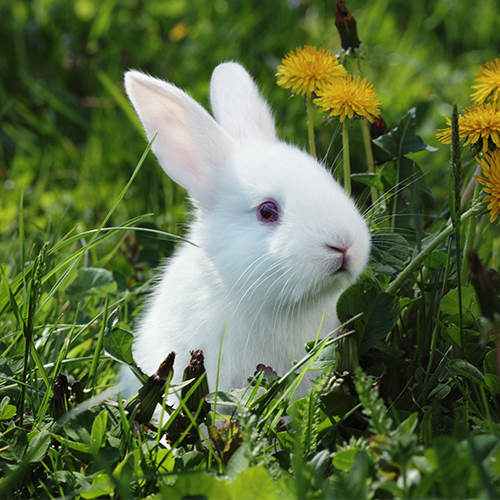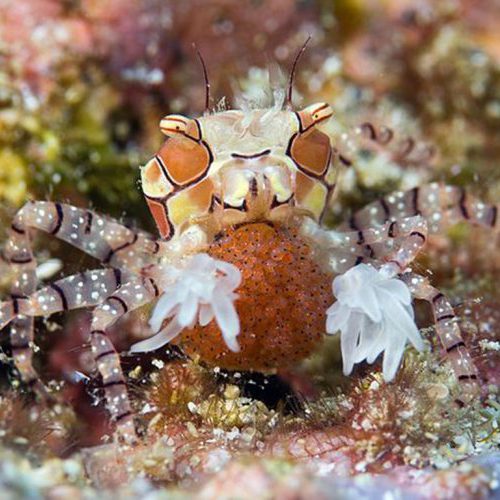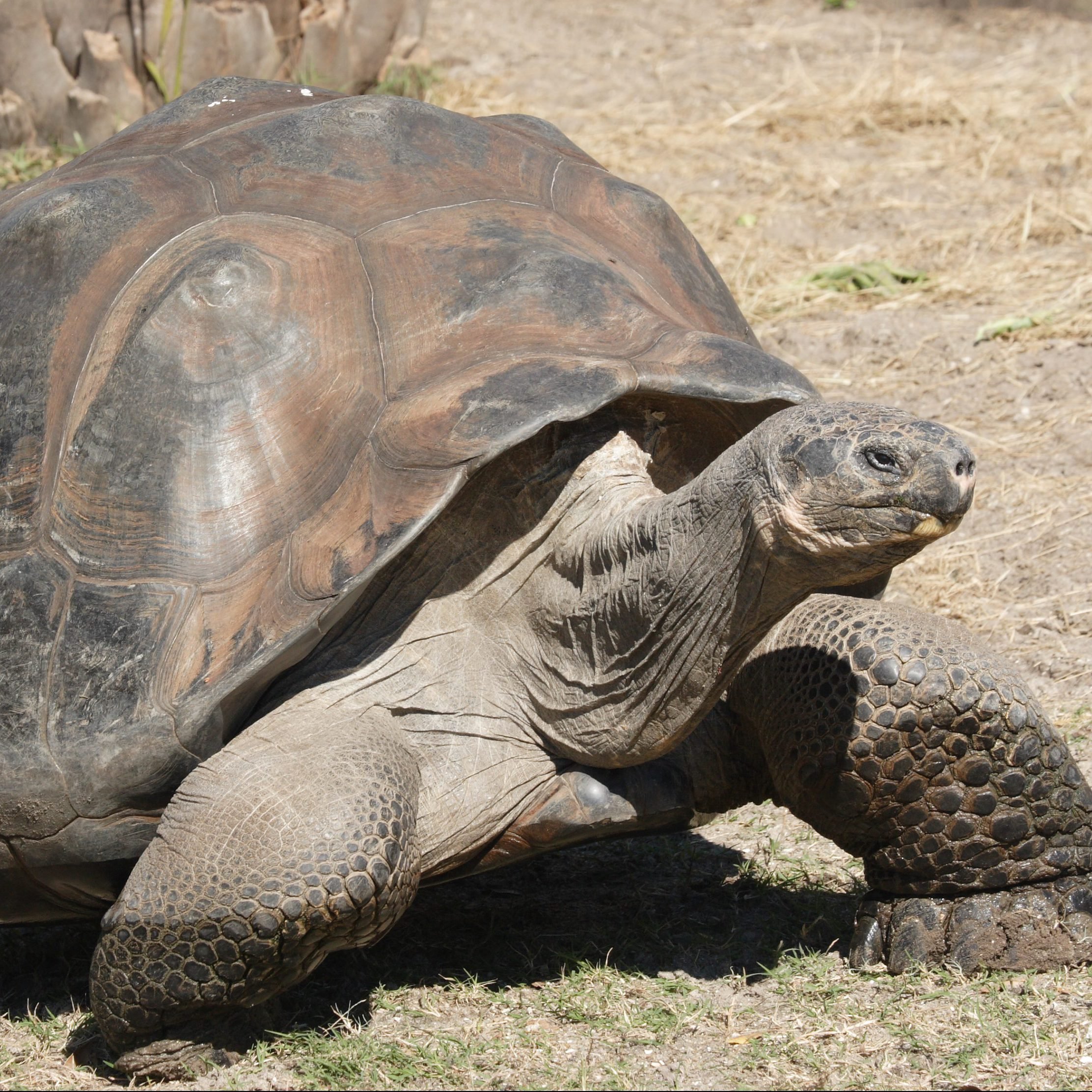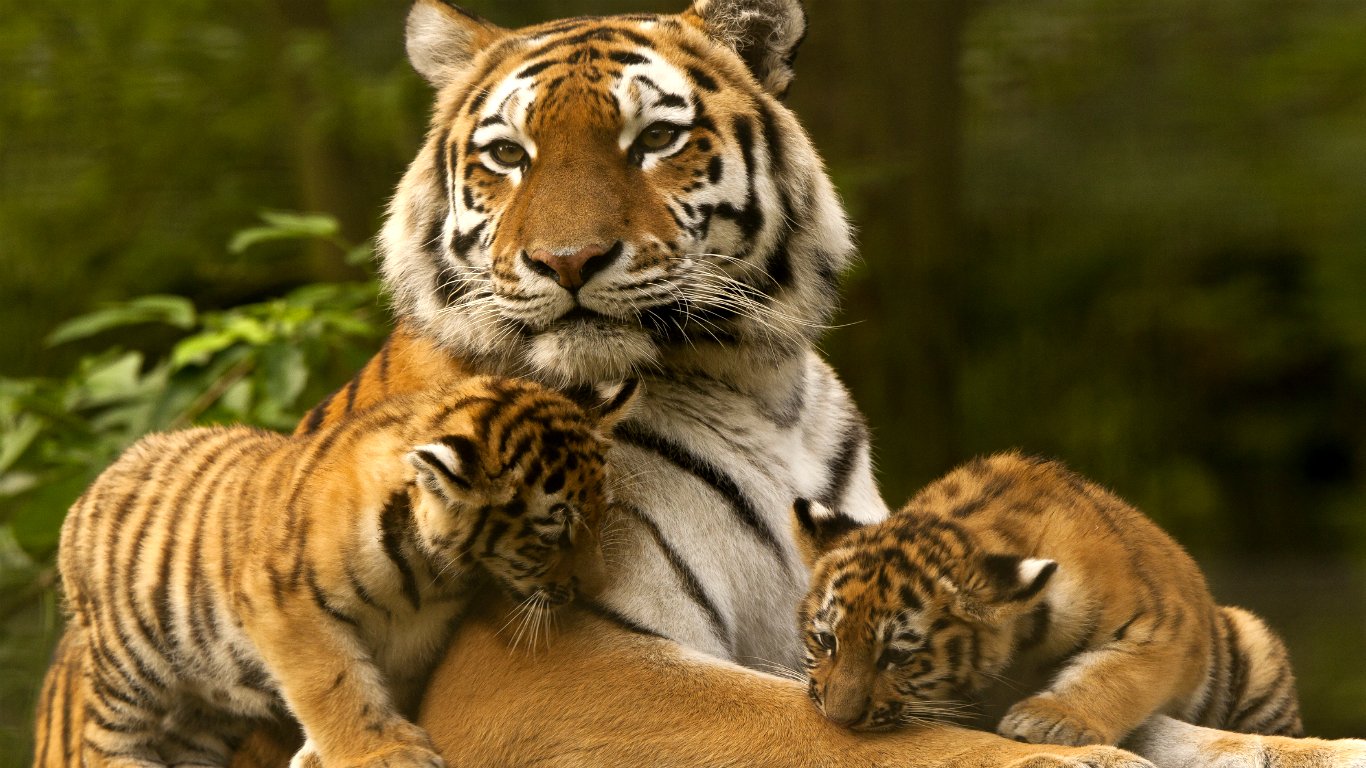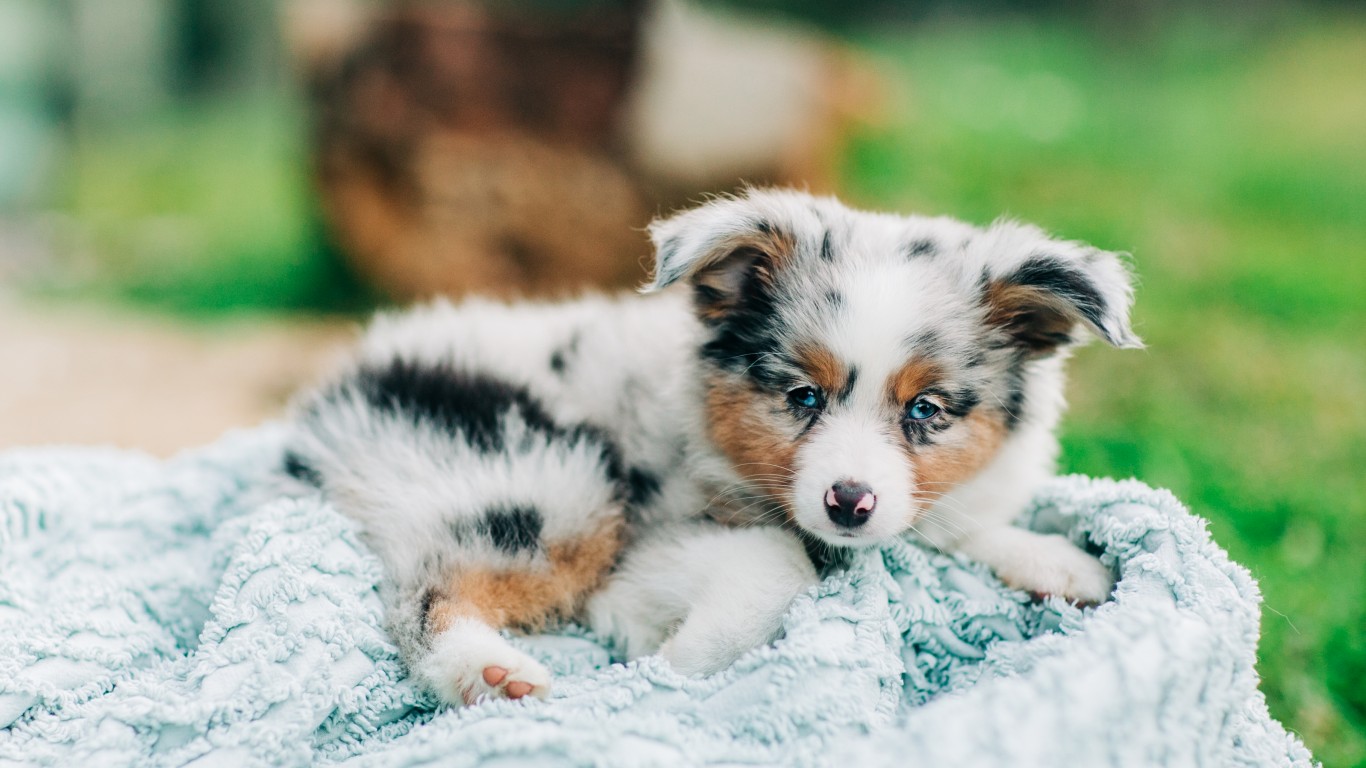

Almost every year, the American Kennel Club, the country’s purebred dog registry, officially recognizes one or more “new” breeds (some of them centuries old) and adds them to the club’s list. The vetting process is quite rigorous. There are over 340 dog breeds known throughout the world, but as of 2022, the AKC officially recognized only around 200. (Of that number, these are America’s most popular dogs.)
To compile a list of dog breeds newly recognized by the American Kennel Club, 24/7 Tempo reviewed information on the registration of all new breeds since 2000 on the AKC website. Information about the breed group, temperament, and life expectancy is also from the AKC.
Becoming an officially recognized breed is a complex procedure. A prospective breed must have a demonstrated U.S. following — that is, there must be a national club devoted to it with at least 100 members. There also must be a substantial population in the country of at least 300 to 400 dogs of the same breed, all with at least a three-generation pedigree. In addition, the breed must be found in 20 or more states. Other considerations include observations by AKC field staff, competitions, and specialty shows. The process often takes years.
These requirements largely explain why the AKC has recognized only 55 new breeds since the turn of the century (and none in 2002, 2005, and 2017).
Click here to see dog breeds you’ve never heard of
Many people get their dogs when they are just puppies and form bonds that last a lifetime. But that takes plenty of training, and some dogs respond to commands better than others. Before you buy a canine compassion, read this list of the most difficult dogs in America.
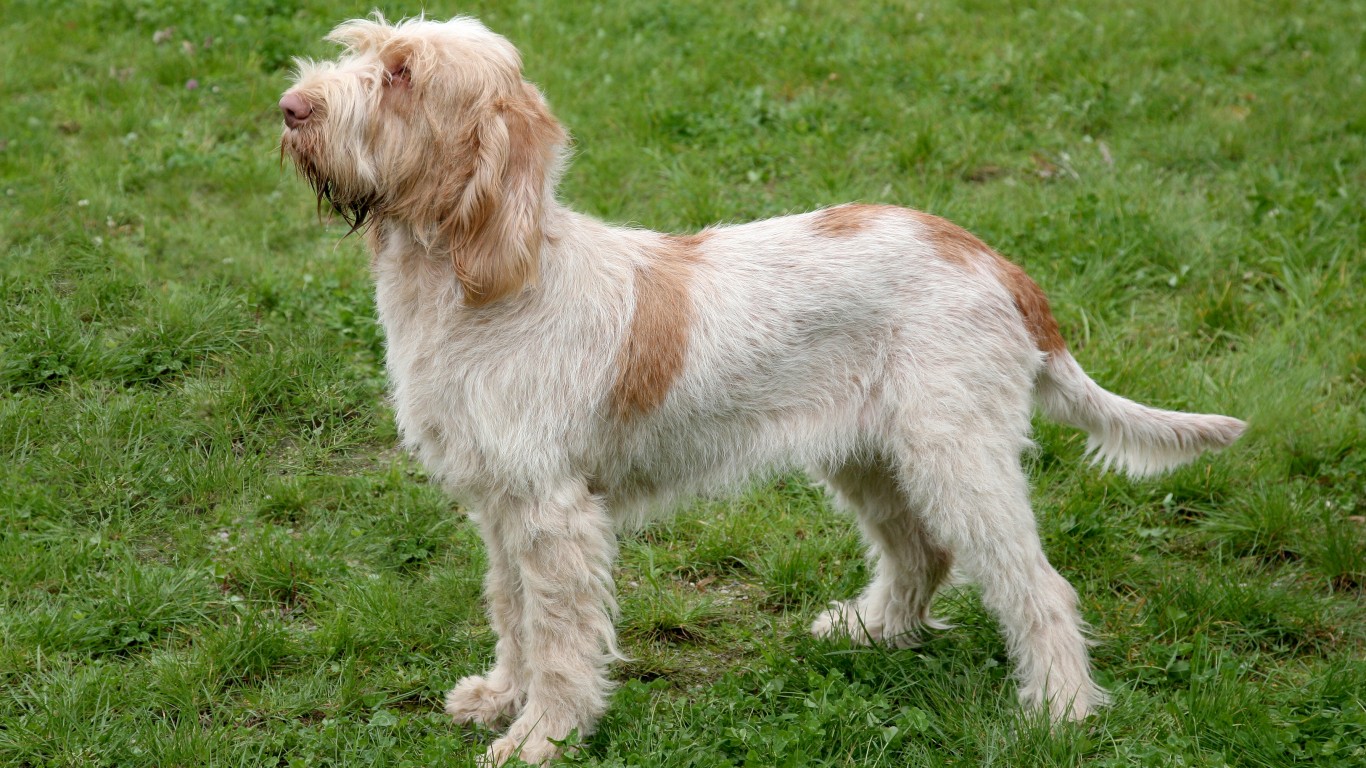
Spinone Italiano
> Year recognized: 2000
> Current popularity rank: 108 out of 197
> Life expectancy: 10-12 years
The spinone italiano is one of the oldest hunting dogs in the world — dating back to 200 — but it was famous mostly in just Italy. The breed was almost extinct during World War II, as breeders and dogs were separated and breed records were lost.
[in-text-ad]
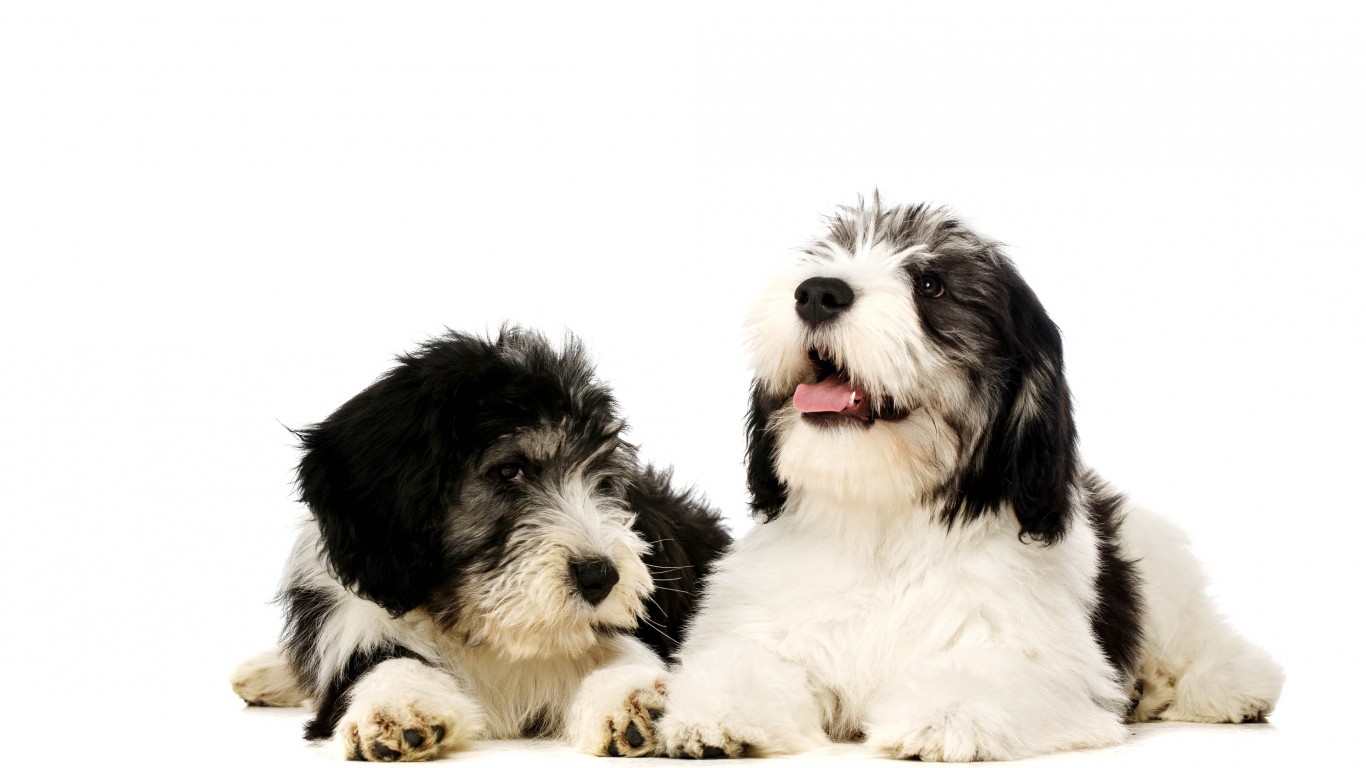
Polish Lowland Sheepdog
> Year recognized: 2001
> Current popularity rank: 180 out of 197
> Life expectancy: 12-14 years
Usually referred to as the PON (short for Polski owczarek nizinny), the Polish lowland sheepdog was recognized in the U.S. in 2001 but its origins go back centuries. The PONs come from Central Asia but eventually became known as a Polish herding breed.
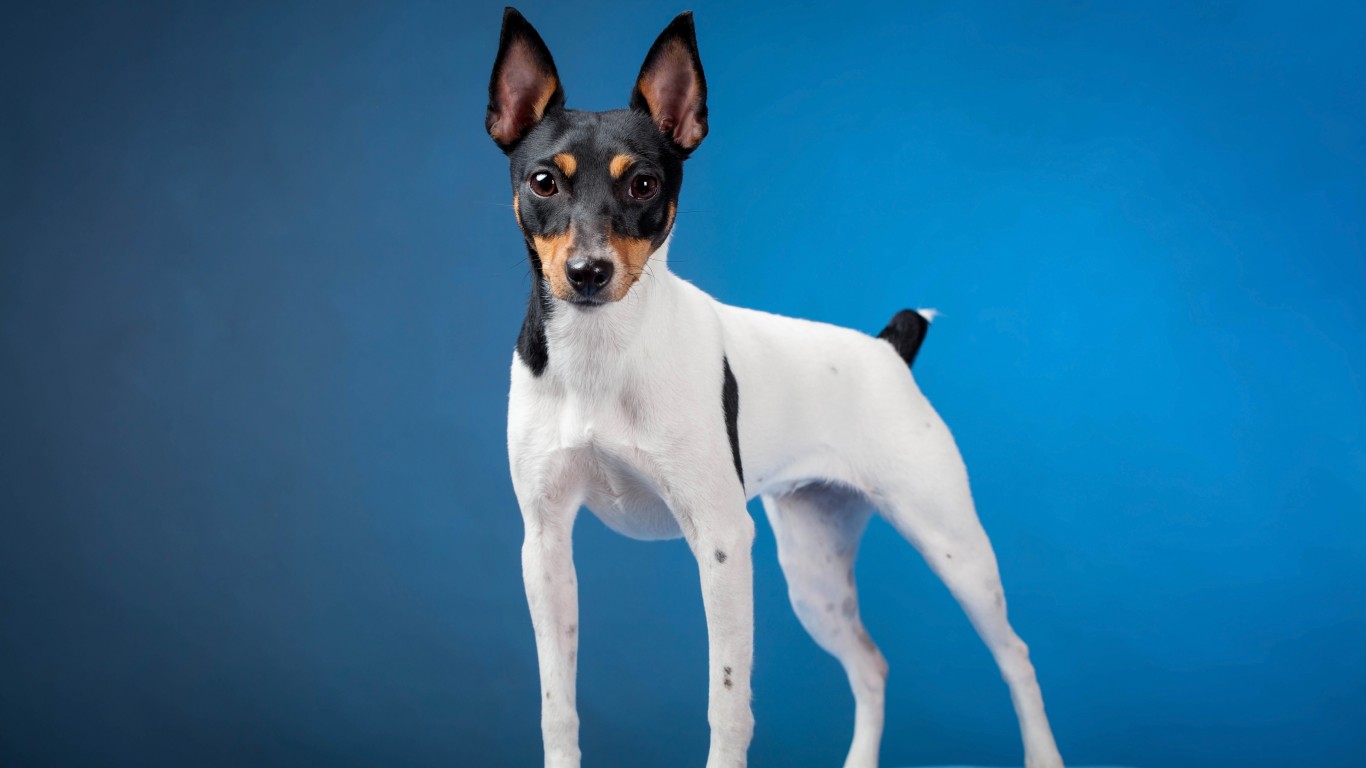
Toy Fox Terrier
> Year recognized: 2003
> Current popularity rank: 110 out of 197
> Life expectancy: 13-15 years
The toy fox terrier is energetic, intelligent, and playful. It was bred in the last century for its size and hunting ability. Farmers who wanted a particularly small dog to catch rodents crossed fox terriers with toy dog breeds. The toy fox terrier was not registered by the American Kennel Club until 2003.
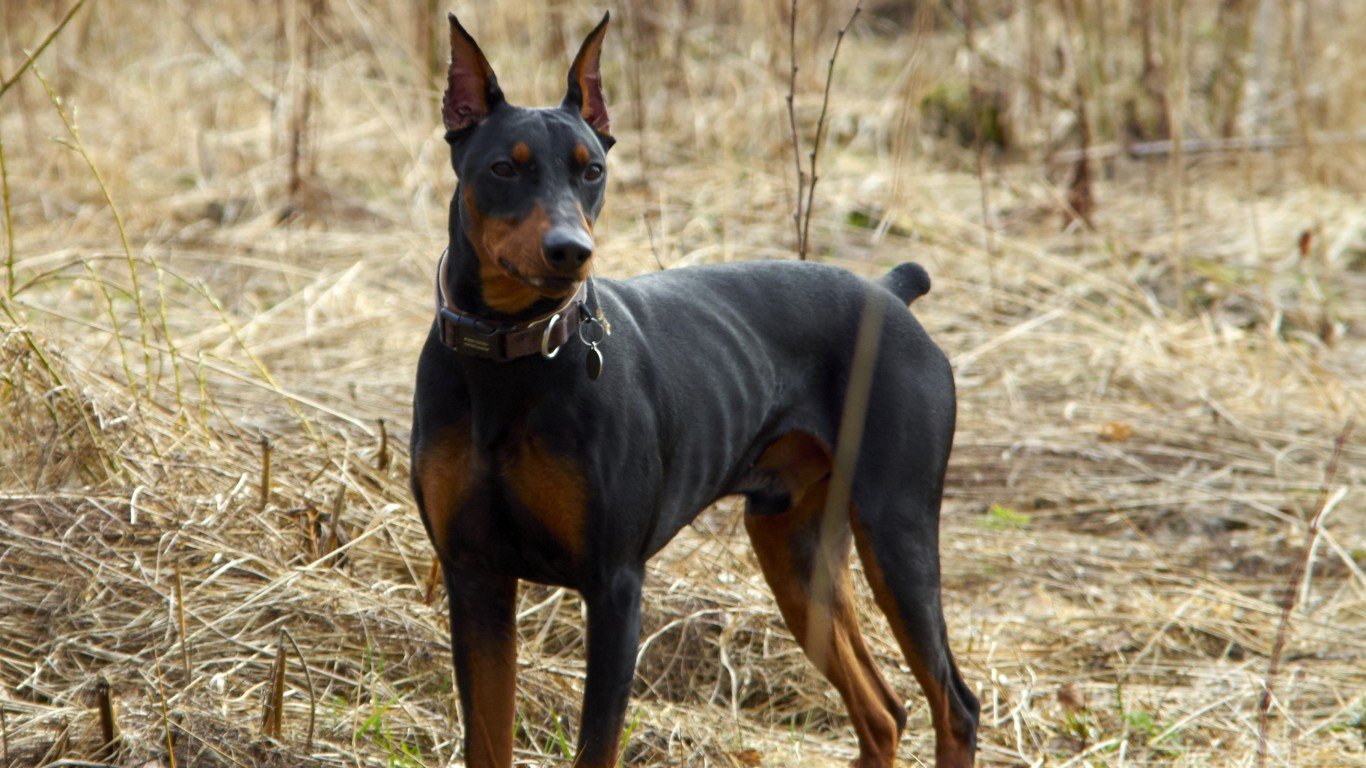
German Pinscher
> Year recognized: 2003
> Current popularity rank: 146 out of 197
> Life expectancy: 12-14 years
The German pinscher is a medium-sized dog and the oldest pinscher breed as well as dog breed in general in Germany. German pinschers are overall healthy dogs, though they can be prone to eye problems and blood disorders.
[in-text-ad-2]

Nova Scotia Duck Tolling Retriever
> Year recognized: 2003
> Current popularity rank: 92 out of 197
> Life expectancy: 12-14 years
The toller is the smallest of the retriever breeds recognized by the AKC. This dog grows to be about 20 inches tall and weighs between 35 and 50 pounds. They are very active and won’t do well in a home with people who don’t have the energy to keep them busy.
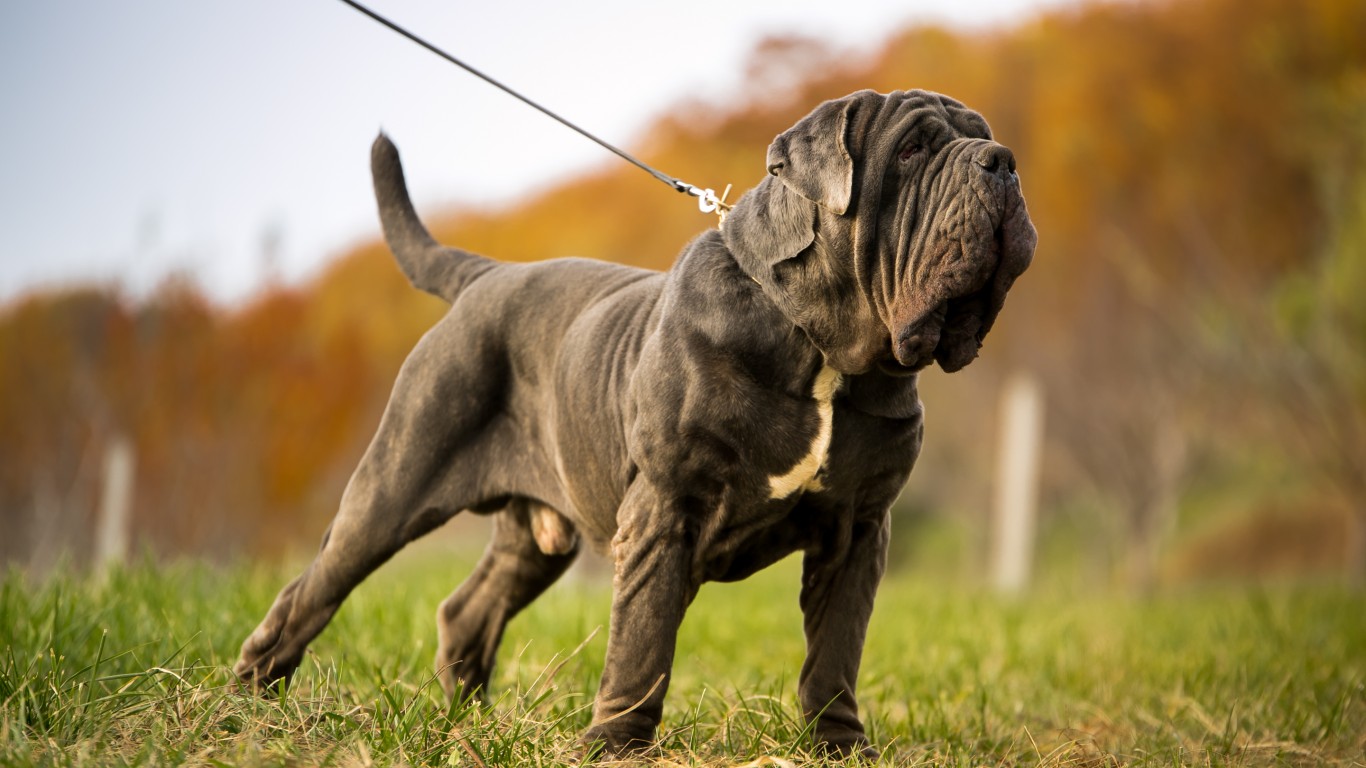
Neapolitan Mastiff
> Year recognized: 2004
> Current popularity rank: 106 out of 197
> Life expectancy: 7-9 years
Often called Neo or Mastino for short, the Neapolitan mastiff weighs about 150 pounds on average. These dogs’ ancient roots can be traced back to 3000 B.C. Even though they look scary, the Neapolitan mastiffs are calm and gentle.
[in-text-ad]
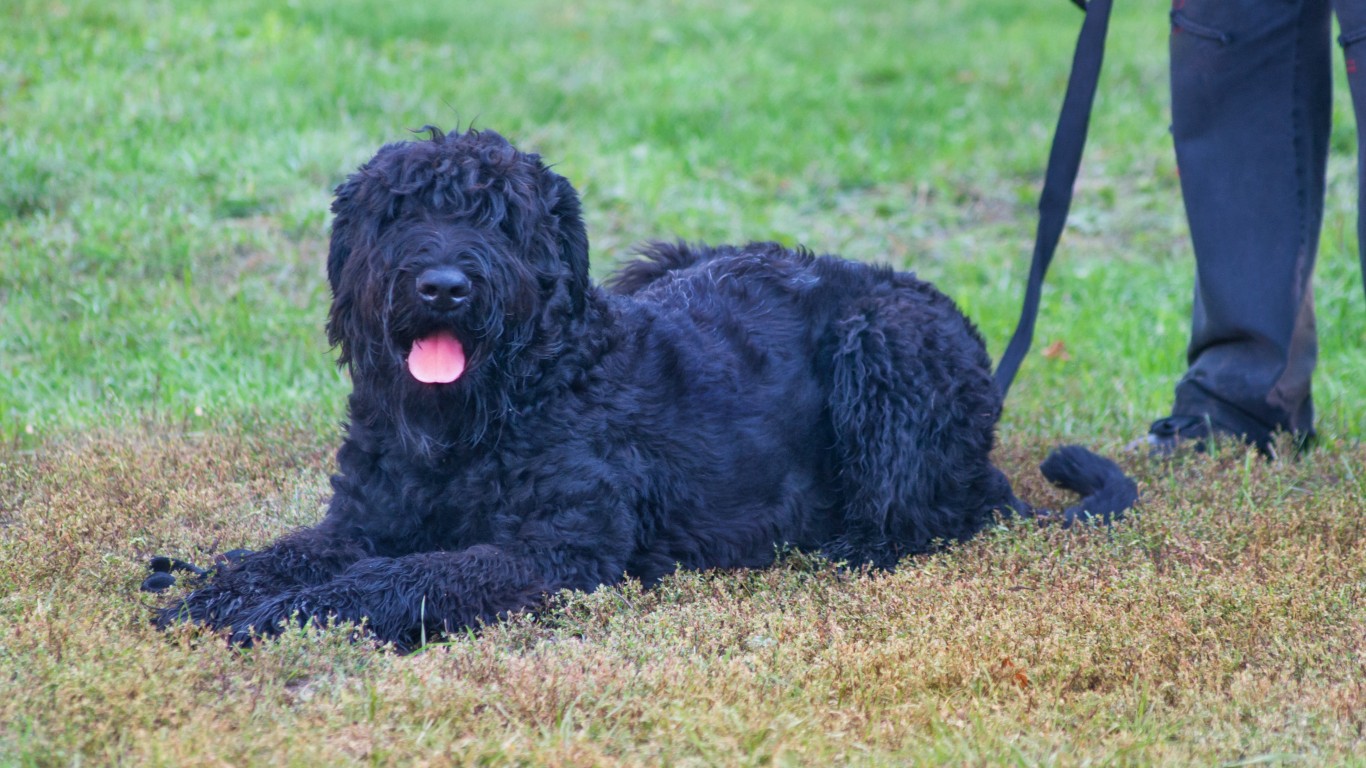
Black Russian Terrier
> Year recognized: 2004
> Current popularity rank: 127 out of 197
> Life expectancy: 10-12 years
The black Russian terrier is a fairly new breed that was developed during the Cold War. The Russian government was looking for its equivalent of the German shepherd, which was the go-to military dog during both world wars. The Soviet military wanted a cold-resistant, uniquely Russian breed, and the result was the black Russian terrier (even though it’s technically not a terrier).
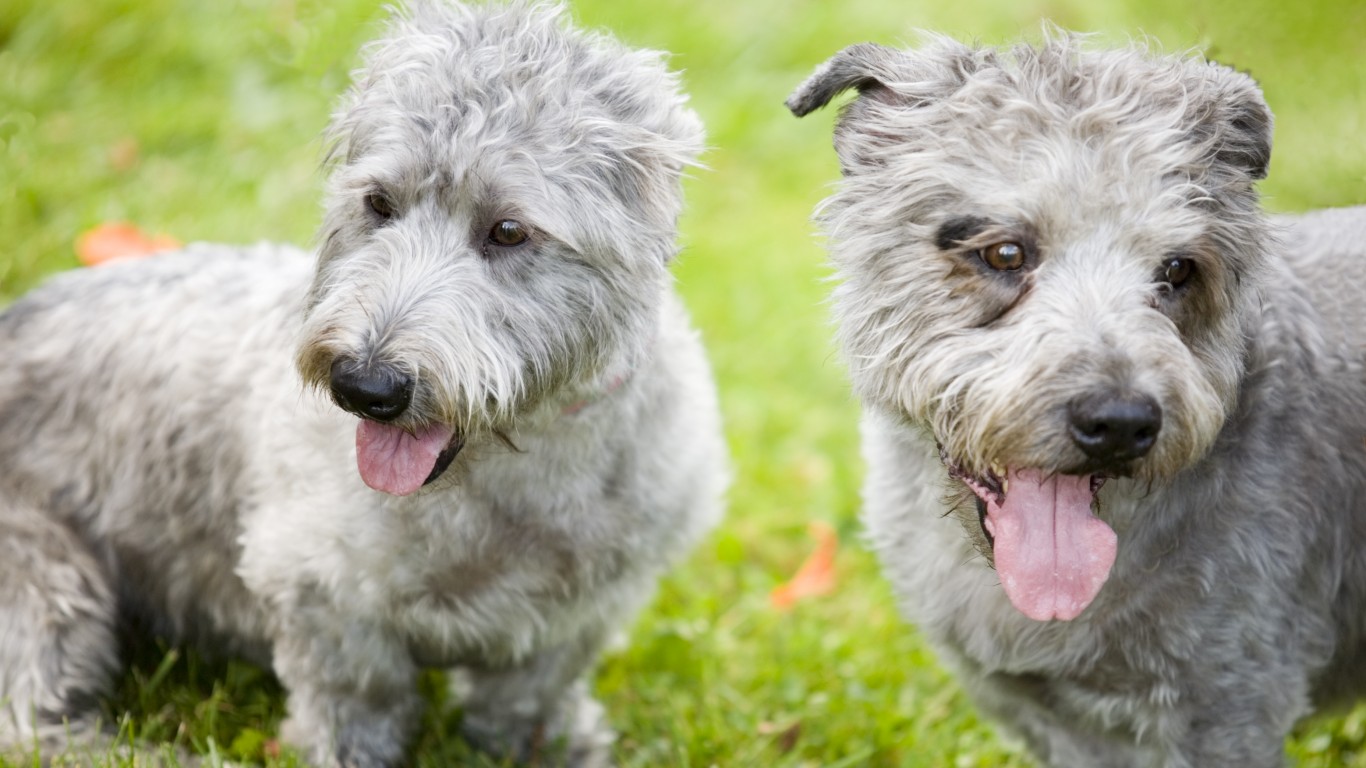
Glen of Imaal Terrier
> Year recognized: 2004
> Current popularity rank: 175 out of 197
> Life expectancy: 10-15 years
Glen of Imaal terriers were initially bred to rid houses of vermin and hunt down foxes, badgers, and other animals, and as all-purpose farm dogs.
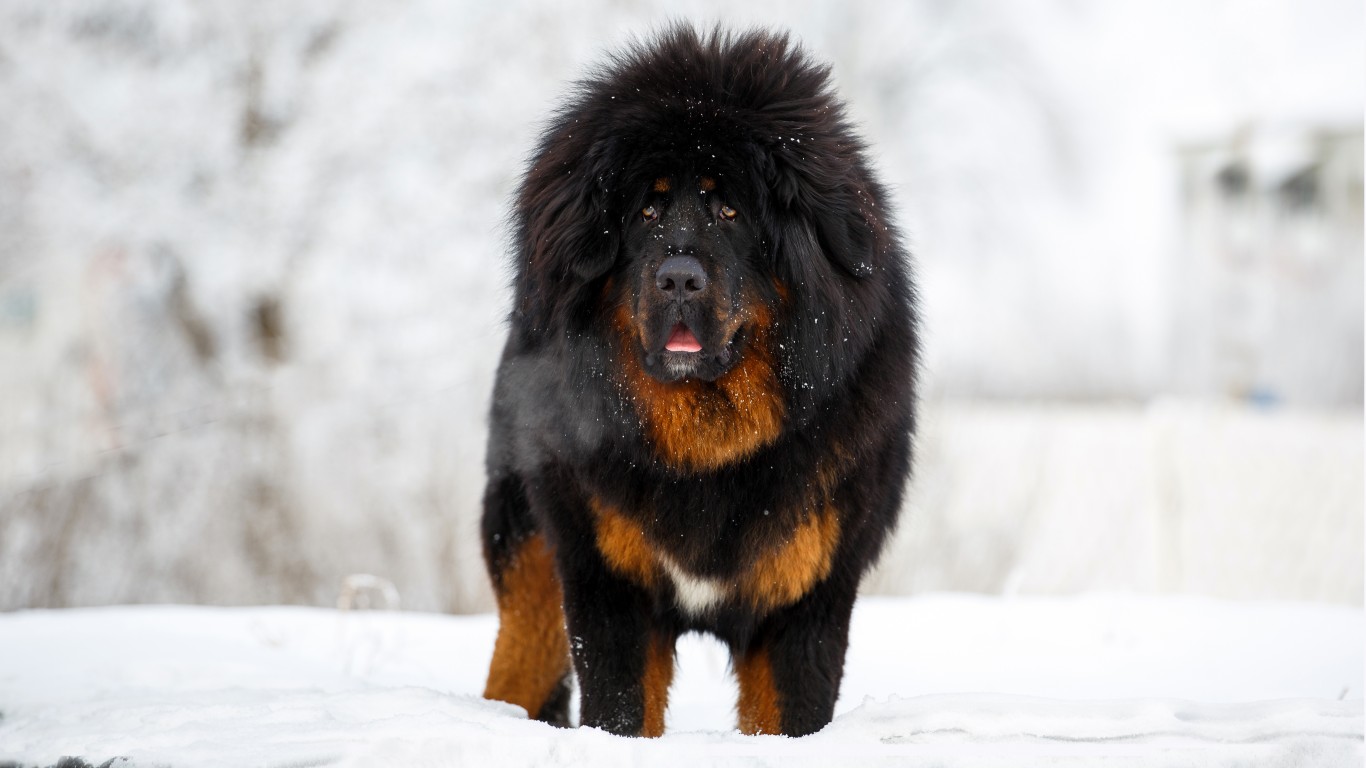
Tibetan Mastiff
> Year recognized: 2006
> Current popularity rank: 147 out of 197
> Life expectancy: 10-12 years
This large, hardy breed was originally used as a guard dog by Tibetan Buddhists and as a sheepdog in the Himalayas, protecting animals from wolves and bears. These dogs have been found to be related to rottweilers, Saint Bernards, and Bernese mountain dogs.
[in-text-ad-2]
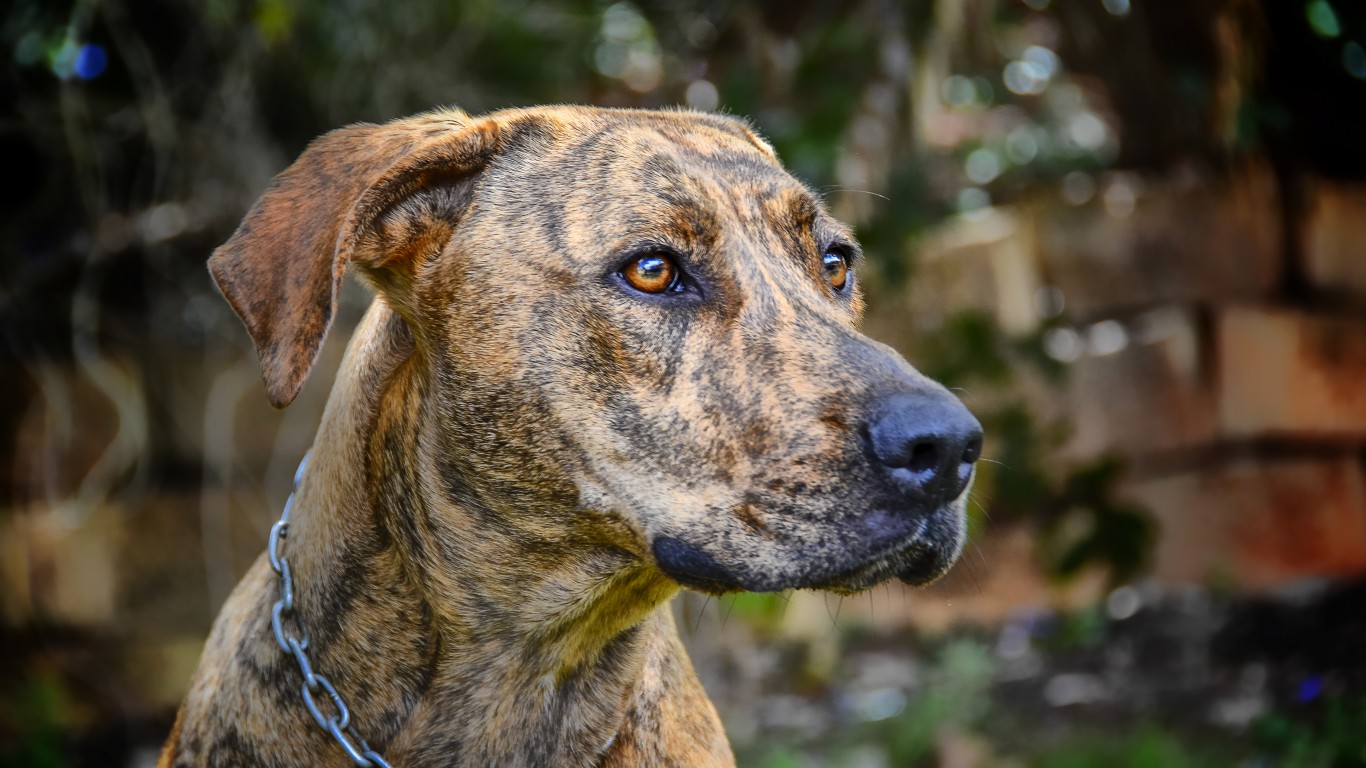
Plott
> Year recognized: 2006
> Current popularity rank: 171 out of 197
> Life expectancy: 12-14 years
The Plott hounds are named after the Plott brothers who left Great Britain for America — but only one made it — in the mid 1700s with their five hunting dogs. They were farm dogs that protected both humans and animals. About a century later, the Plott dogs had a reputation as excellent hunting dogs, and hunters were seeking them out for bear hunts.
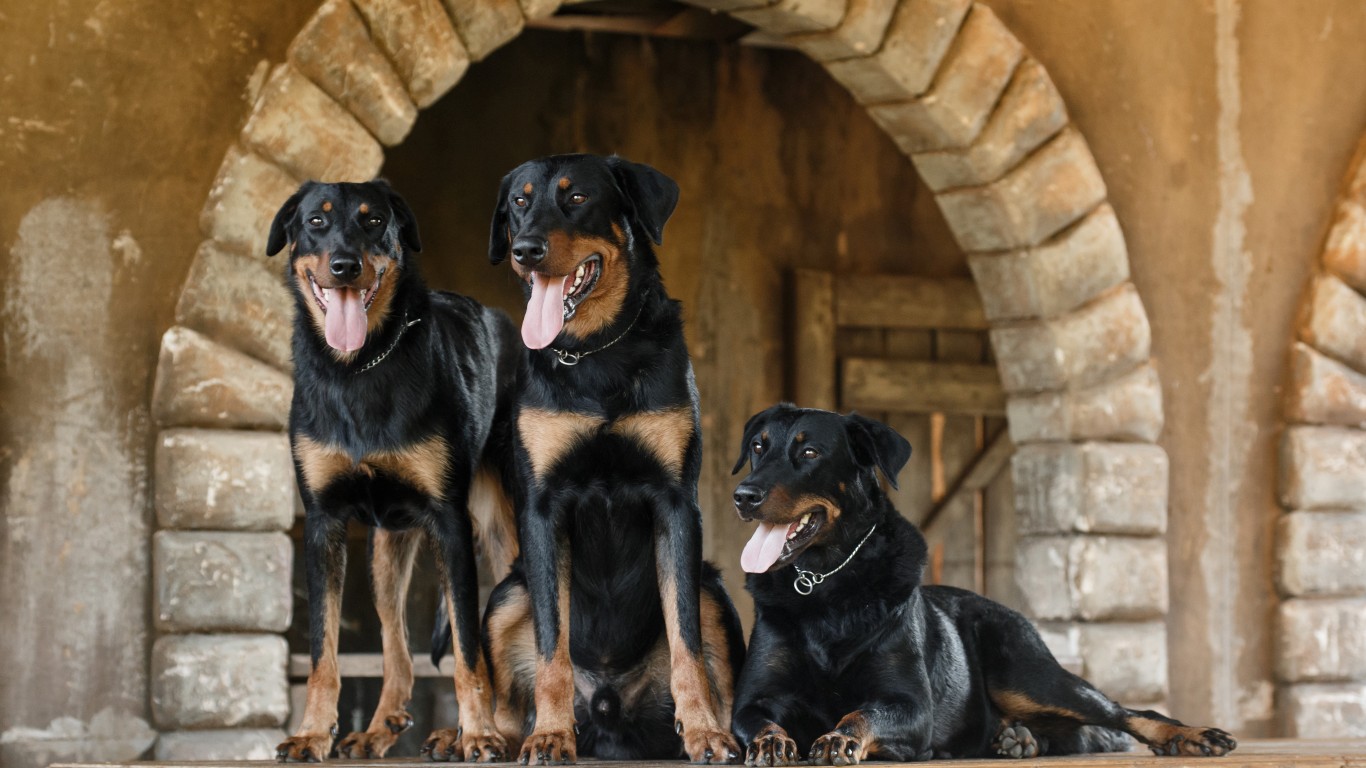
Beauceron
> Year recognized: 2007
> Current popularity rank: 121 out of 197
> Life expectancy: 10-12 years
Beaucerons are described as gentle giants. Sometimes weighing over 100 pounds, these powerful dogs are also faithful and obedient. These dogs are known to be sensitive and protective of their owners.
[in-text-ad]
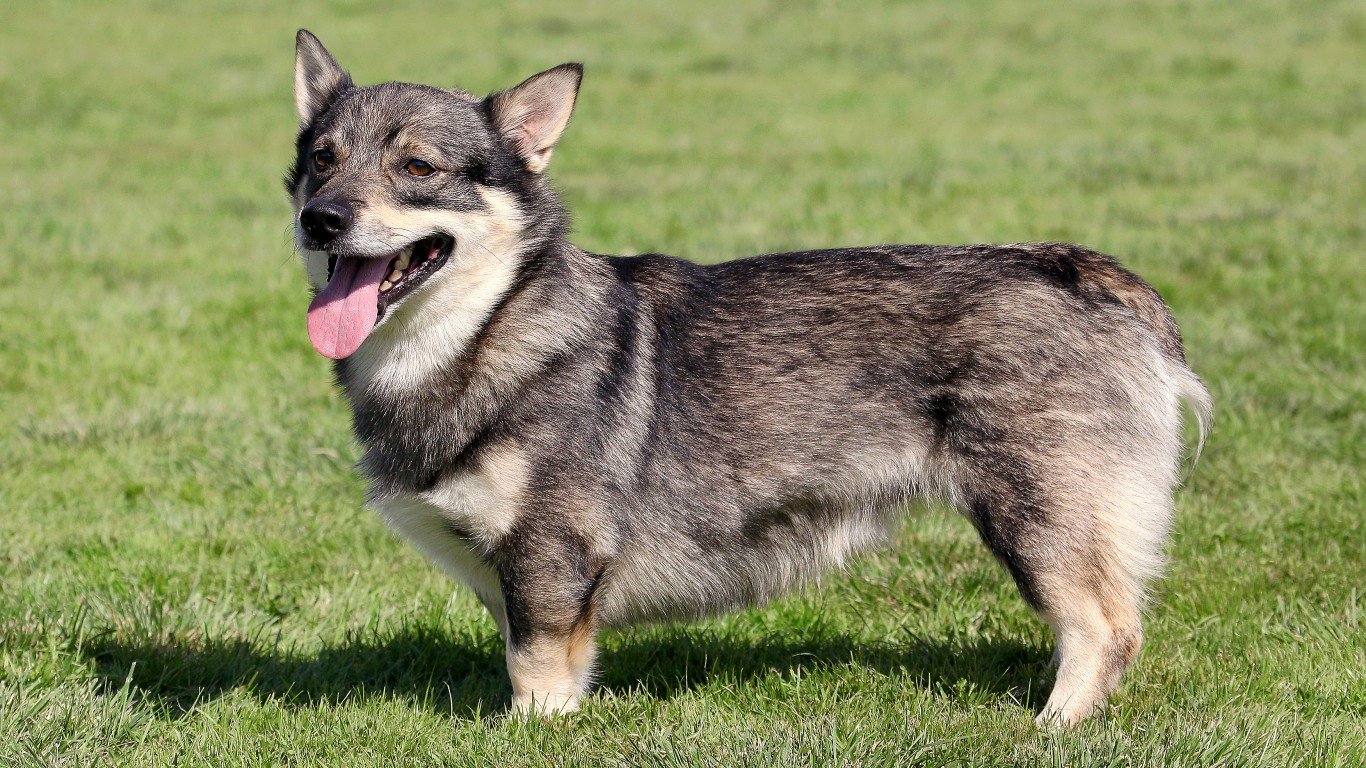
Swedish Vallhund
> Year recognized: 2007
> Current popularity rank: 160 out of 197
> Life expectancy: 12-15 years
Vallhund means “herding dog” and the breed dates back to the time of the Vikings. It almost went extinct but was revived in the 1940s and first brought to the U.S. in the 1980s. It is similar in appearance to the corgi, but not as stocky.
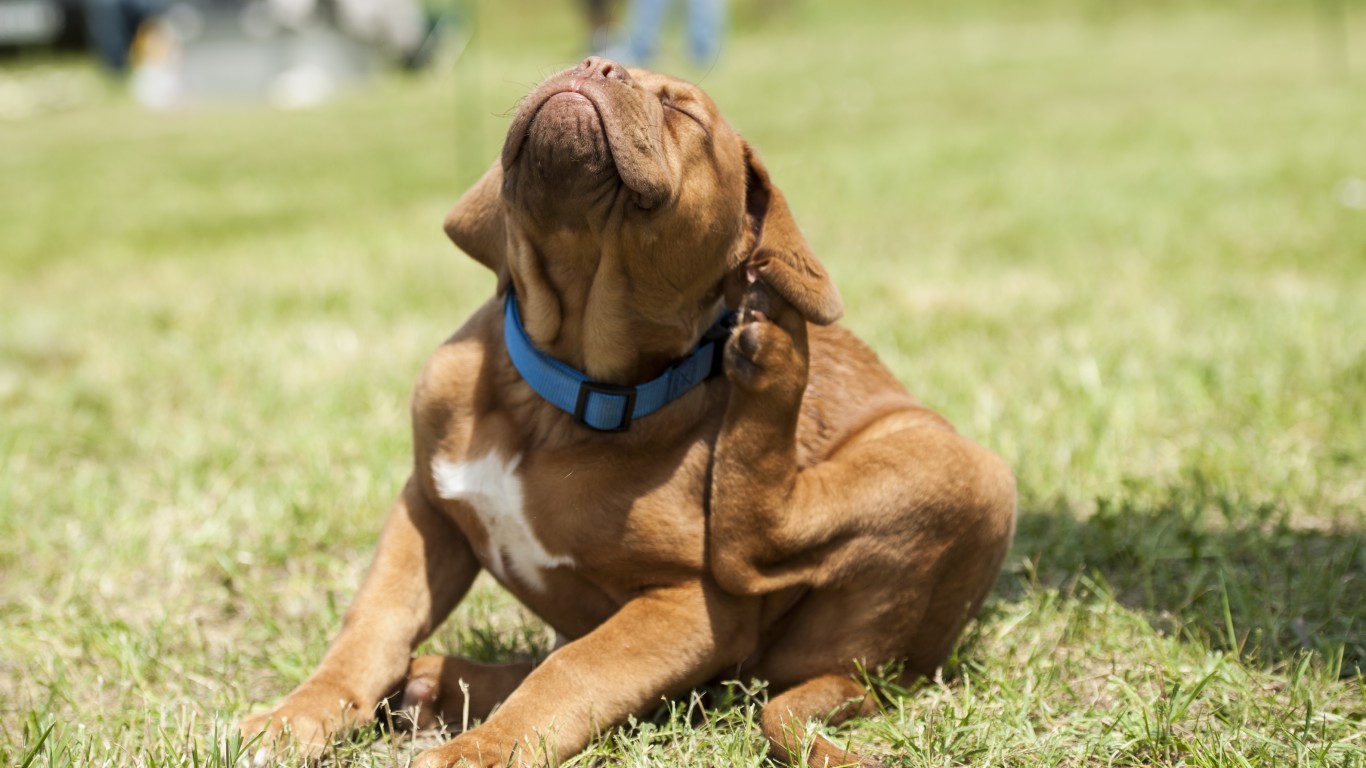
Dogue de Bordeaux
> Year recognized: 2008
> Current popularity rank: 70 out of 197
> Life expectancy: 5-8 years
Dogue is French for “mastiff,” and this is a big, muscular breed with a massive head. While it is not aggressive, it is not great with other dogs. Dogue de Bordeaux was featured in the 1989 Tom Hanks’ movie “Turner and Hooch” but was not recognized by the AKC until 2008.
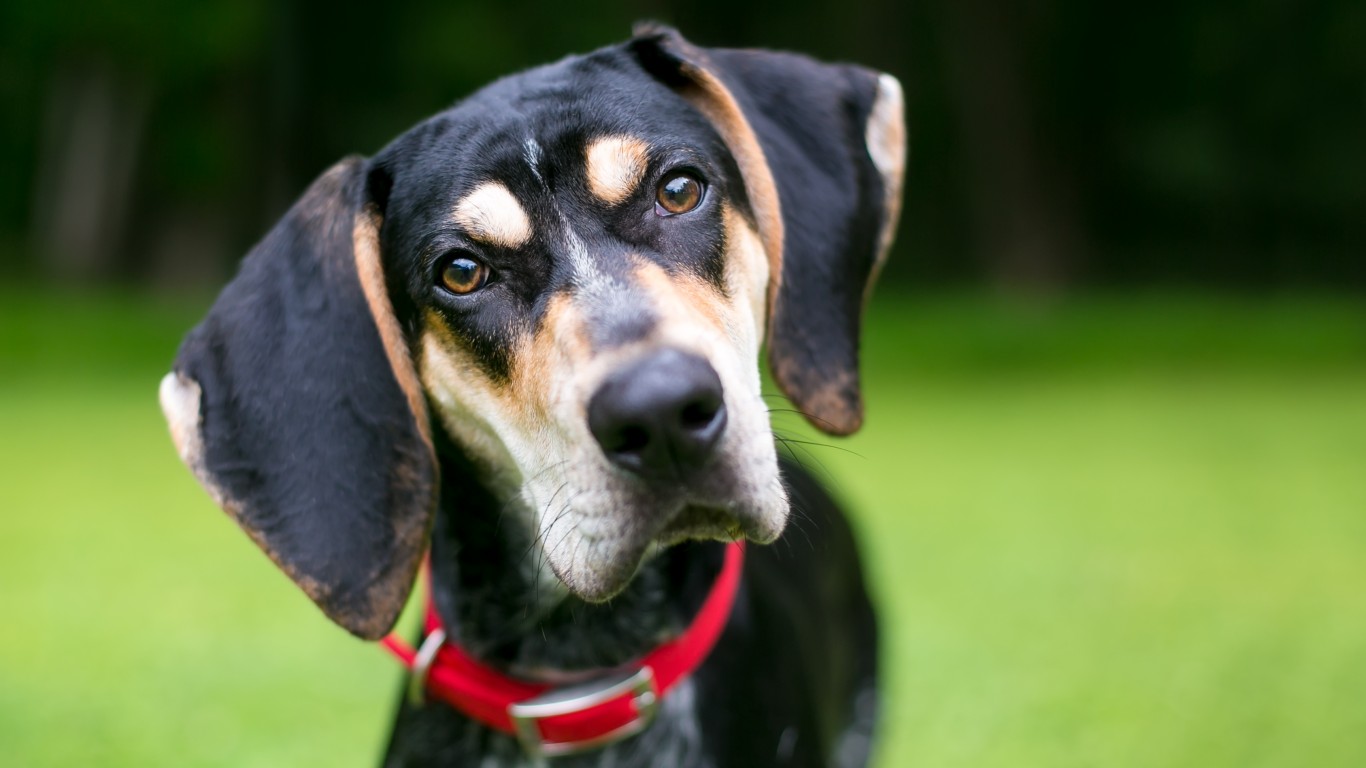
Bluetick Coonhound
> Year recognized: 2009
> Current popularity rank: 140 out of 197
> Life expectancy: 11-12 years
Named for its mottled coat, the bluetick is a sleek, strong, nocturnal hunter with an exceptional nose. It can be challenging as a pet because it needs a job and plenty of exercise. It has a very strong drive to pursue prey, and it likes to bark, especially when in pursuit.
[in-text-ad-2]
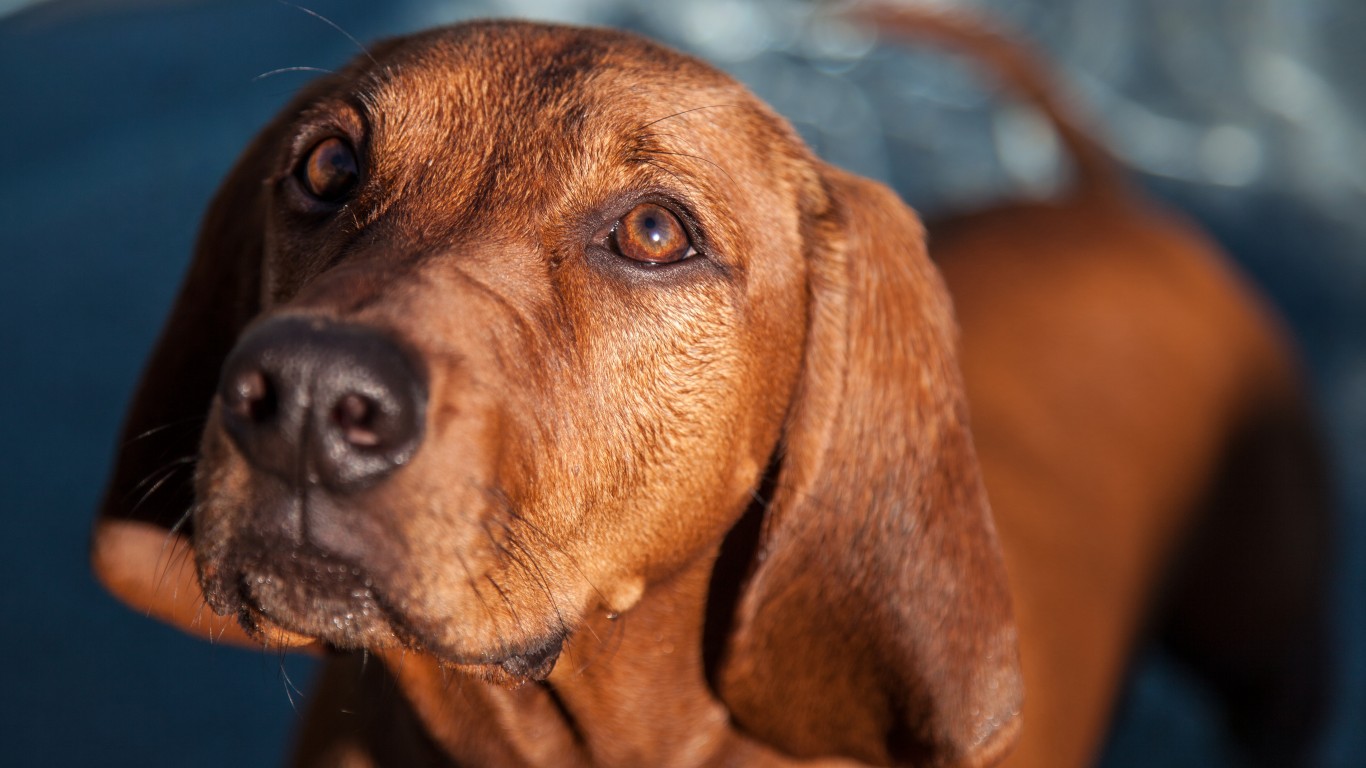
Redbone Coonhound
> Year recognized: 2009
> Current popularity rank: 155 out of 197
> Life expectancy: 12-15 years
As its name suggests, this is a red-colored hunting dog best suited to rural areas. It is descended from red hounds brought to the U.S. by early settlers from Scotland and Ireland. It is a cold-nosed dog, meaning it is good at following old, or cold, trails.
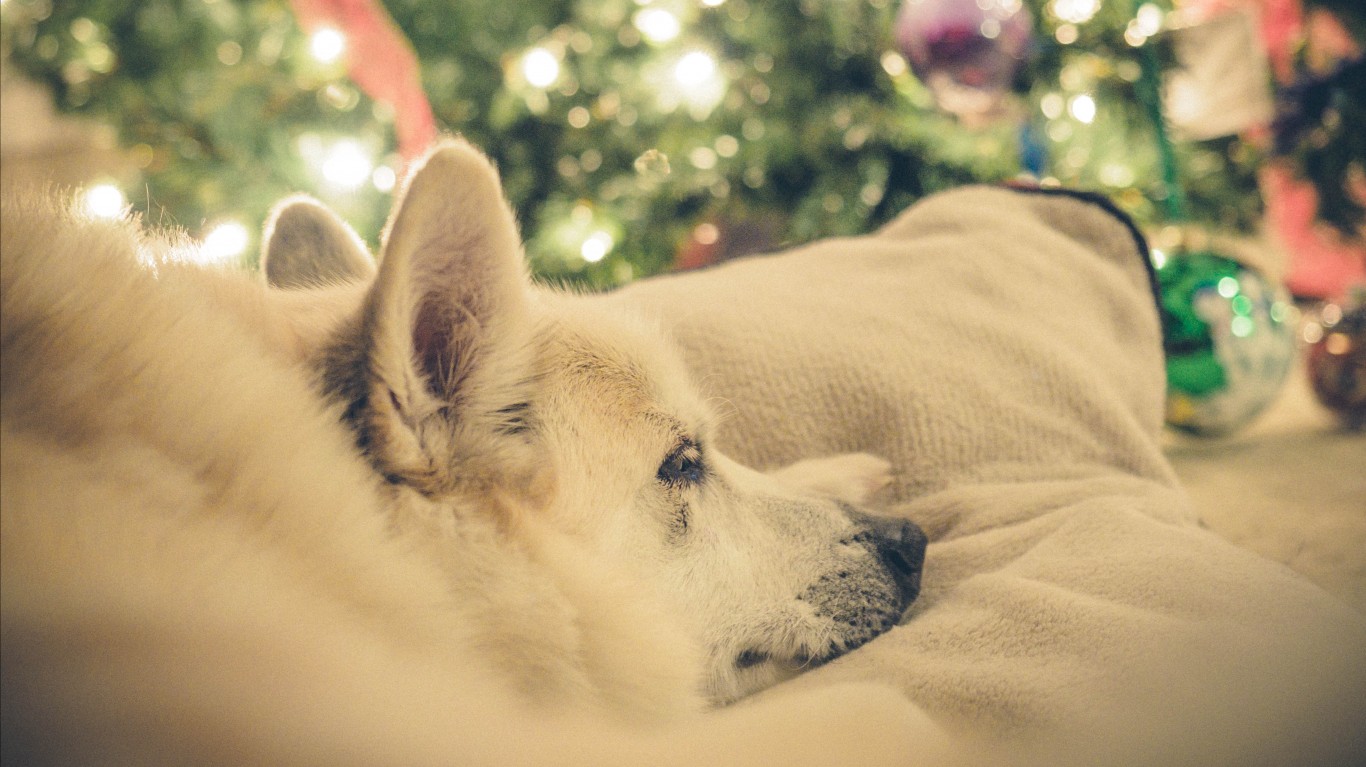
Norwegian Buhund
> Year recognized: 2009
> Current popularity rank: 170 out of 197
> Life expectancy: 12-15 years
The buhund is an extremely intelligent herding and guard dog, with a lot of energy, strength, and stamina. It is very obedient and can be trained for police work and to aid the hearing impaired. It is also a good watchdog and likes to bark.
[in-text-ad]
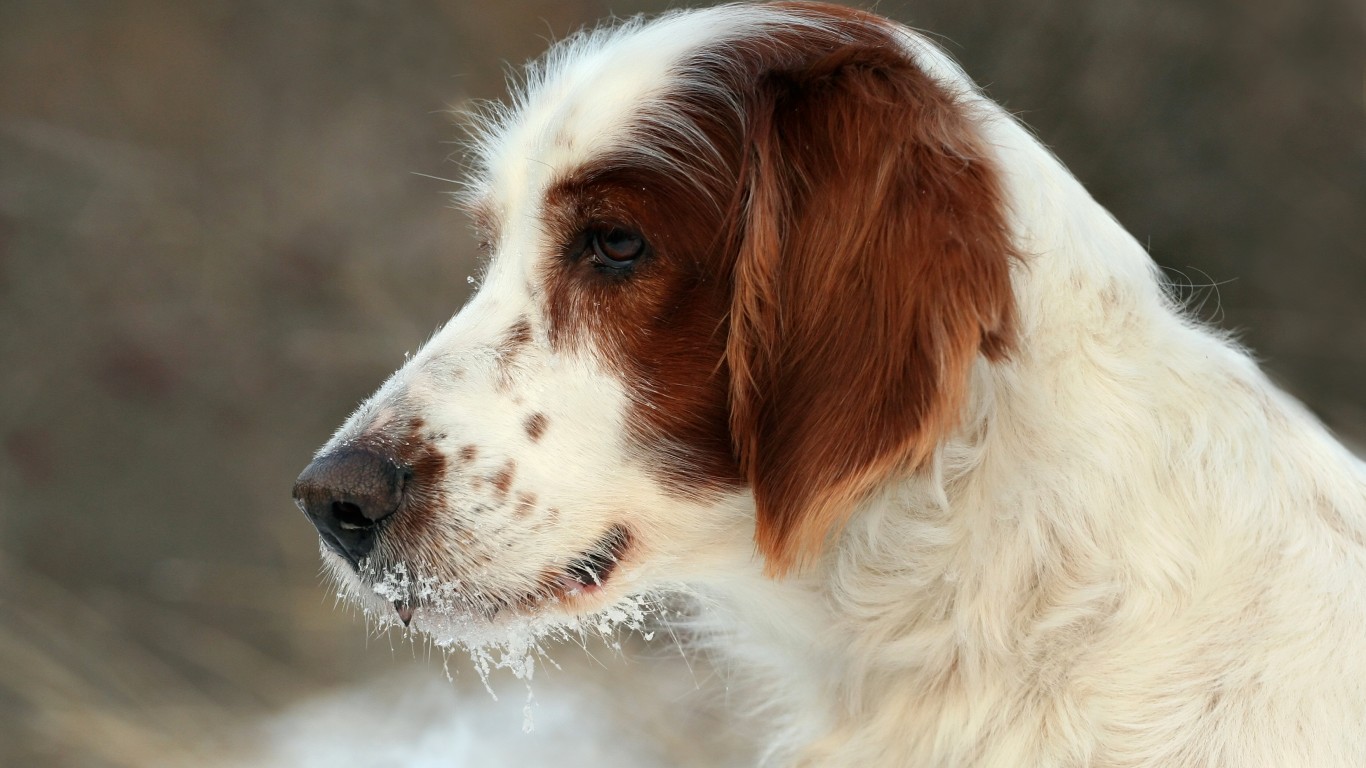
Irish Red and White Setter
> Year recognized: 2009
> Current popularity rank: 154 out of 197
> Life expectancy: 11-15 years
The Irish red and white setter has long silky fine hair on the back of the fore and hind legs. These dogs are shorter than the Irish setter but are also bred for the field. These are high energy dogs that need plenty of exercise.
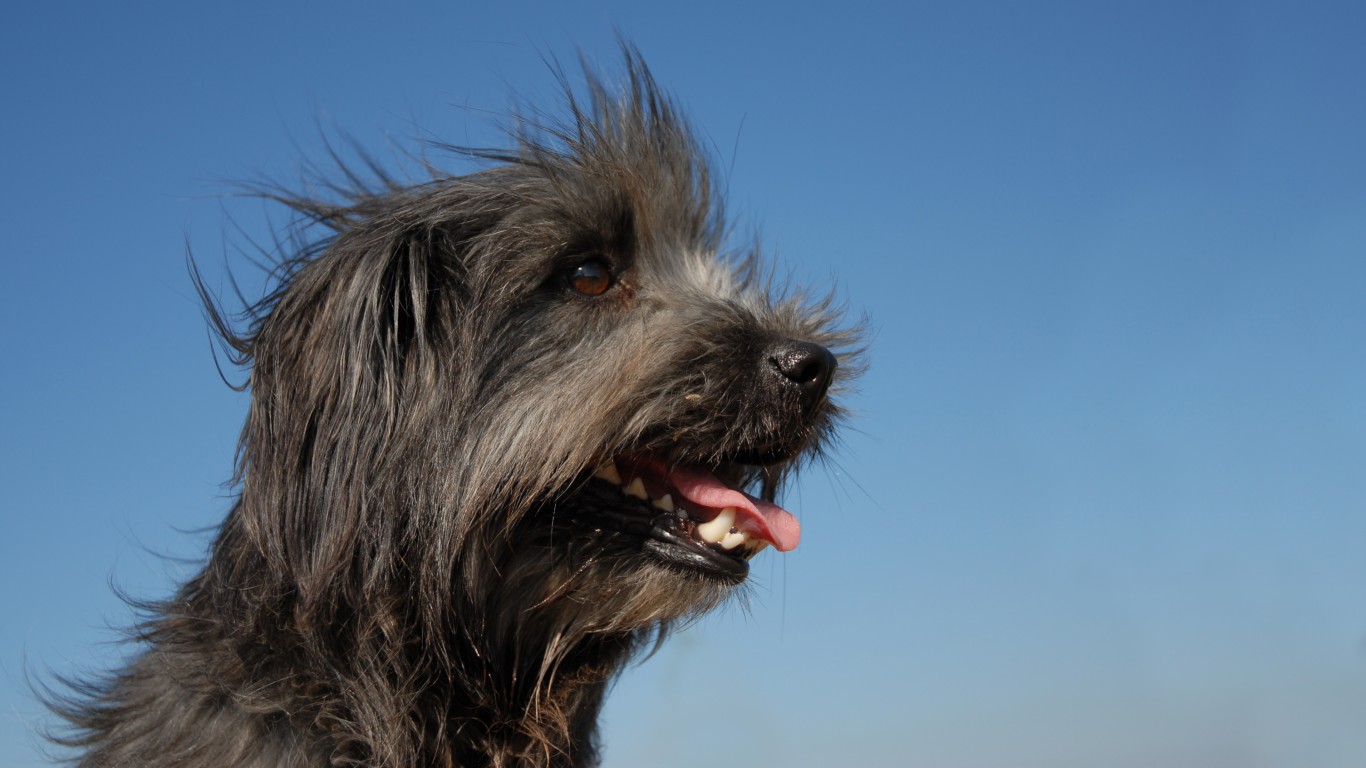
Pyrenean Shepherd
> Year recognized: 2009
> Current popularity rank: 192 out of 197
> Life expectancy: 18 years
The Pyr shep originated in the Pyrenees Mountains and is still used today as a sheep herder. It is extremely devoted to its owner and needs to be kept busy. It comes in rough-faced and smooth-faced varieties that can be born within the same litter.
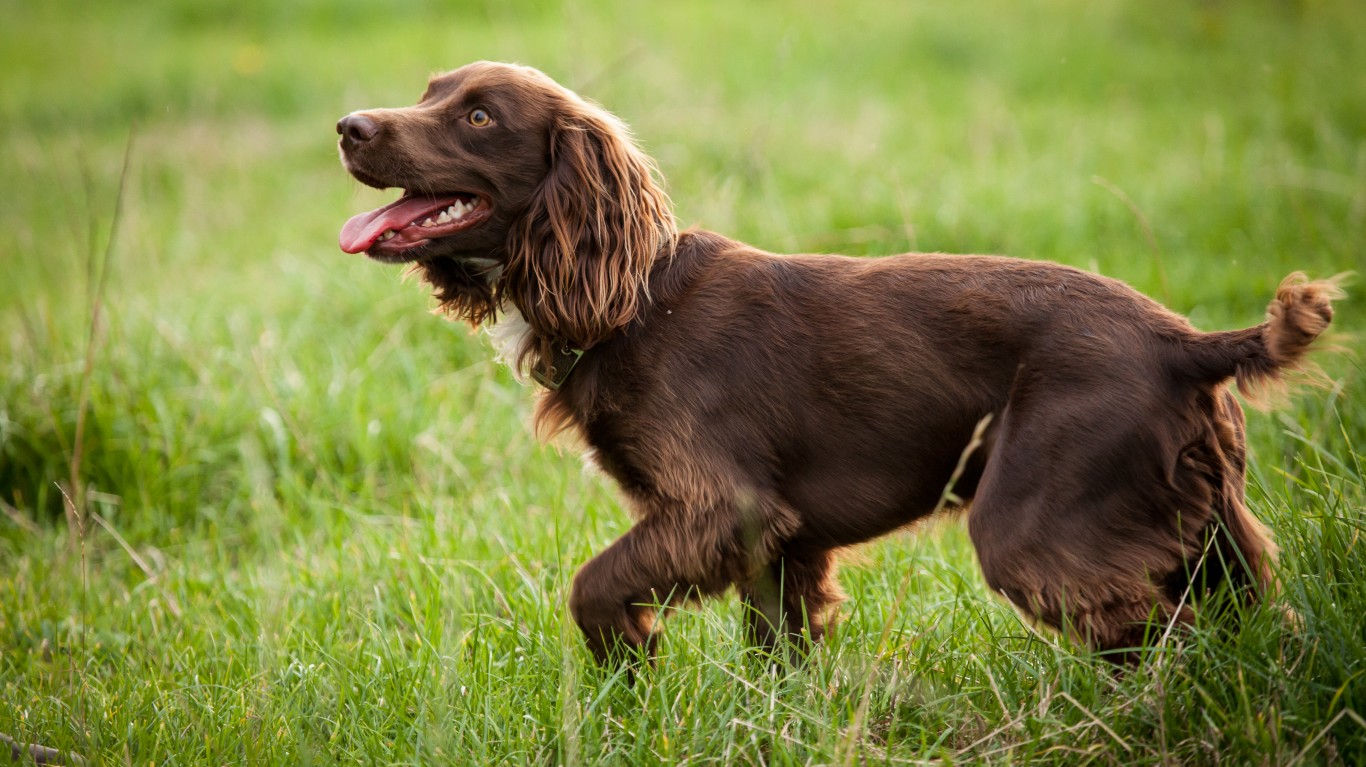
Boykin Spaniel
> Year recognized: 2009
> Current popularity rank: 90 out of 197
> Life expectancy: 10-15 years
The Boykin spaniel is named after L.W. “Whit” Boykin of South Carolina. It was first bred in the early 1900s for hunting ducks and wild turkeys in the Wateree River Swamp. Conditions there required a rugged dog that could retrieve birds on land and water and could fit in a small boat.
[in-text-ad-2]
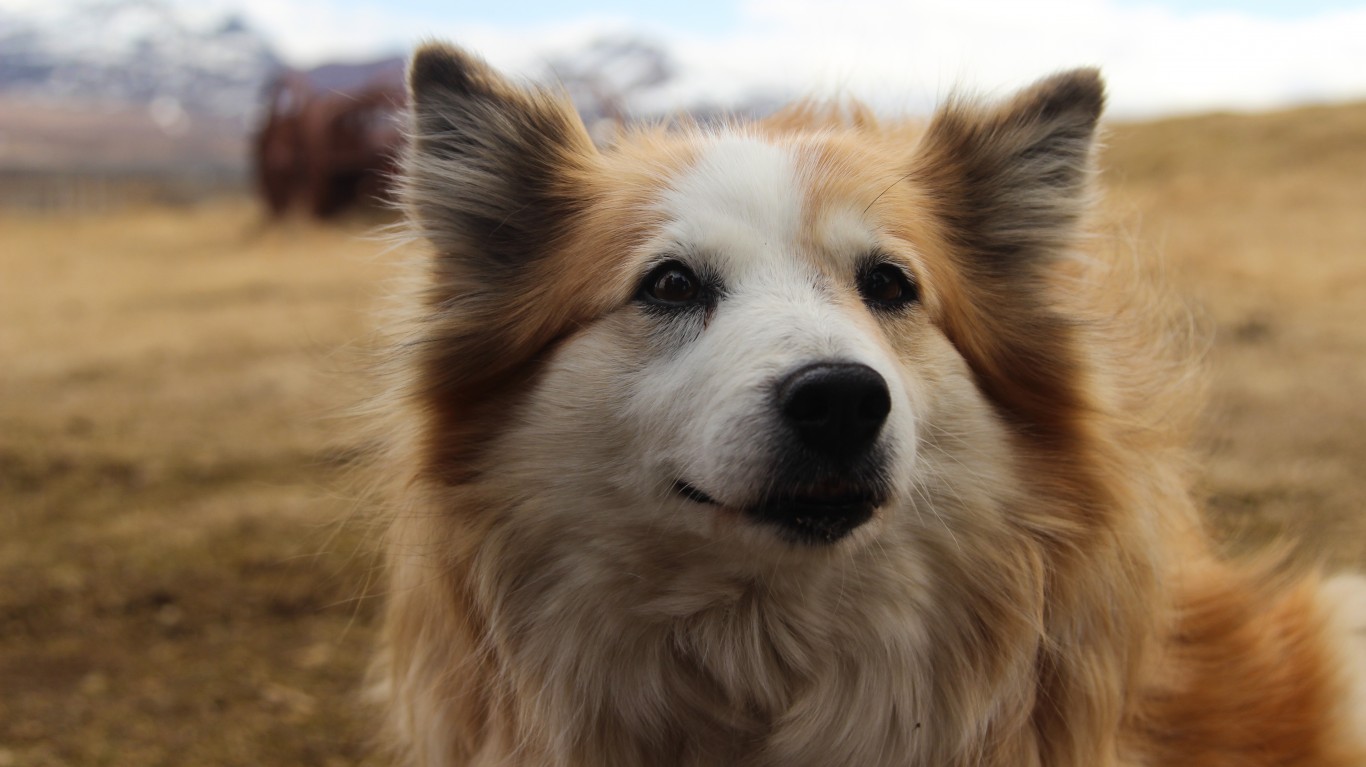
Icelandic Sheepdog
> Year recognized: 2010
> Current popularity rank: 138 out of 197
> Life expectancy: 12-14 years
Known as the “Dog of the Vikings,” the Icelandic sheepdog is a spitz type with a foxy face and friendly expression. Spitz characteristics include pointy ears and a bushy tail. The Icelandic sheepdog can have a long or short coat, but both types are thick and weatherproof. A true herding dog, it is athletic and very active.
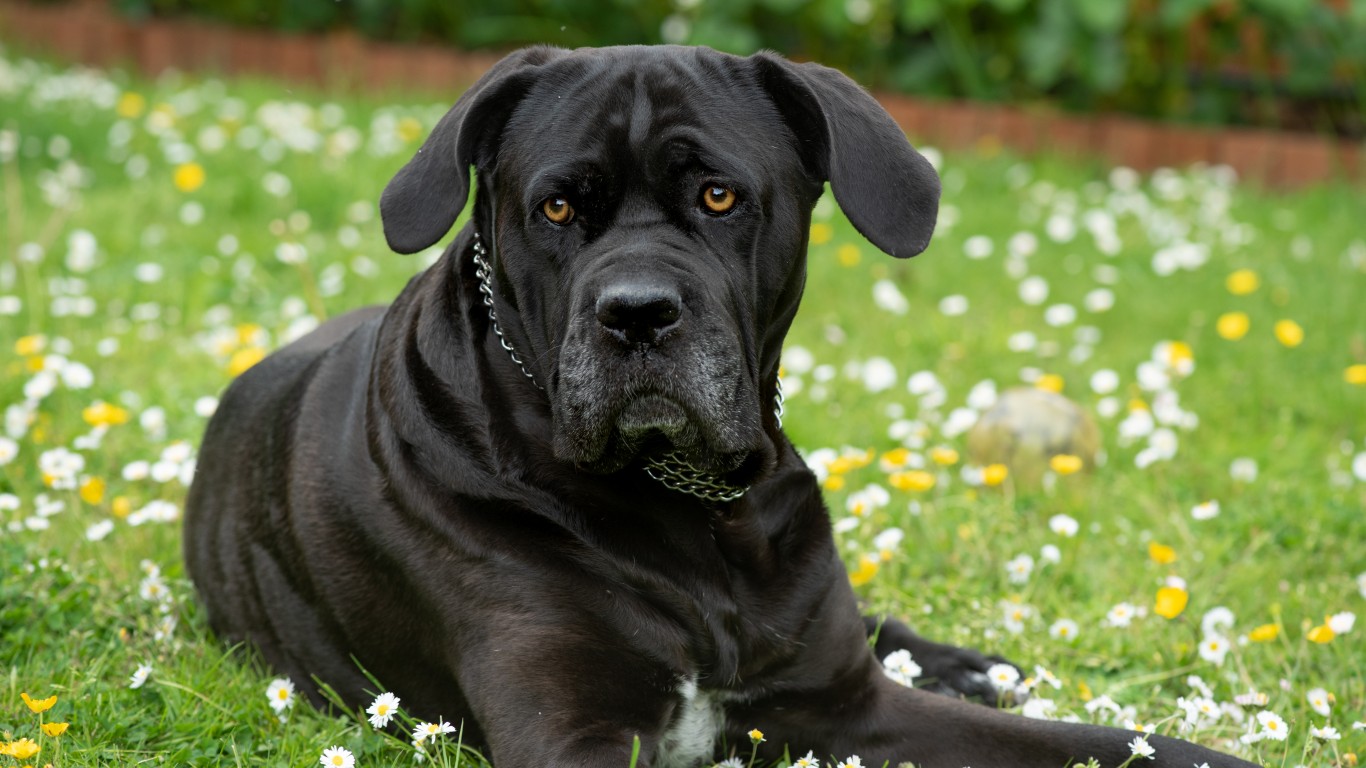
Cane Corso
> Year recognized: 2010
> Current popularity rank: 21 out of 197
> Life expectancy: 9-12 years
Originating in Italy and bred as a guard dog, the cane corso is described by the AKC as a peerless protector. This dog is intelligent, loyal, and docile in the company of its owners. However, that docility may not extend to others, and the cane corso requires intensive socialization and training.
[in-text-ad]
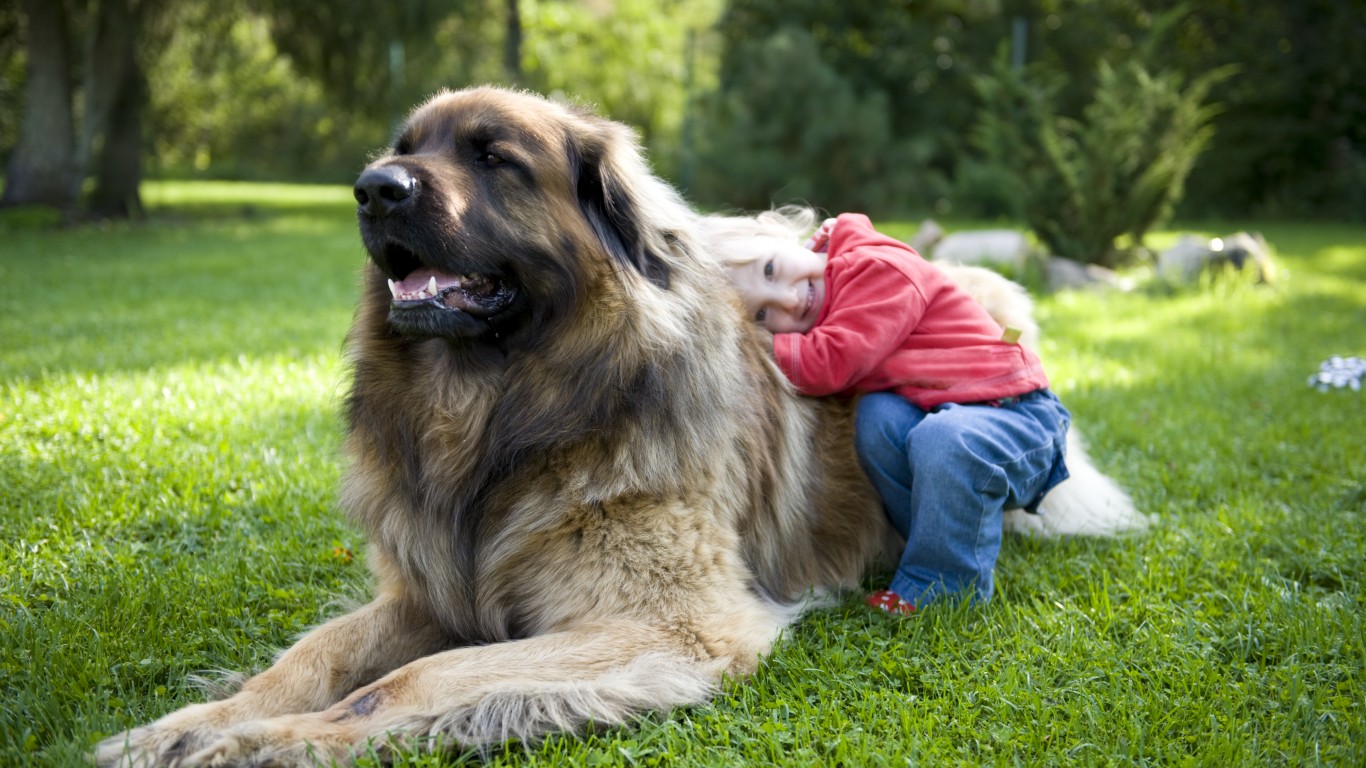
Leonberger
> Year recognized: 2010
> Current popularity rank: 102 out of 197
> Life expectancy: 9 years
The Leonberger was popularized by Heinrich Essig of Leonberg, Germany, in the 1800s. This very large breed caught the attention of artists and celebrities and was even used in theater productions in the U.S. It almost went extinct after World War I but was revived in Europe and re-established in America in the 1970s and 1980s.
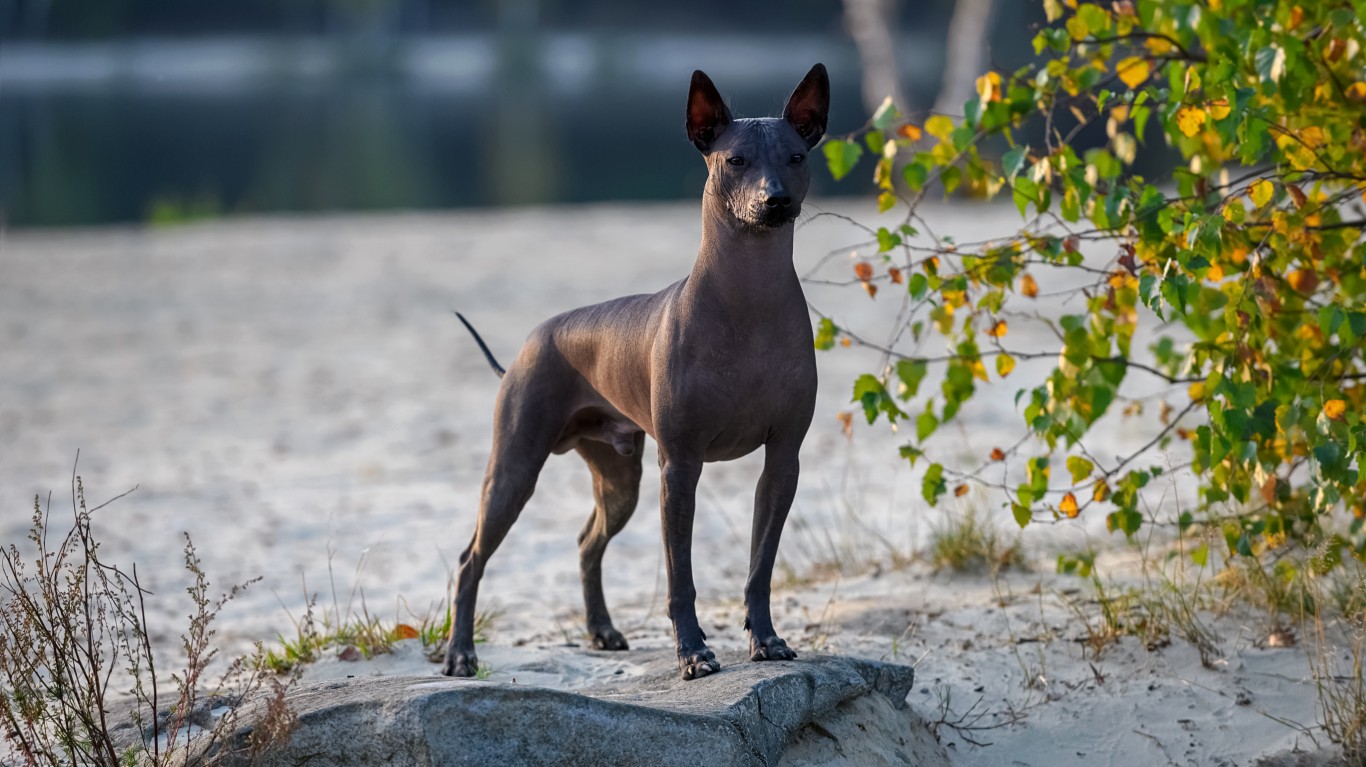
Xoloitzcuintli
> Year recognized: 2011
> Current popularity rank: 119 out of 197
> Life expectancy: 13-18 years
The Xoloitzcuintli was named after an Aztec god — the Aztecs revered the breed and believed it to have healing powers. One of the world’s most ancient breeds, it was actually registered with the AKC from 1887 to 1959 as the Mexican hairless dog, but was dropped because of insufficient numbers being bred and registered. The Xoloitzcuintl was subsequently revived and officially recognized in 2011.
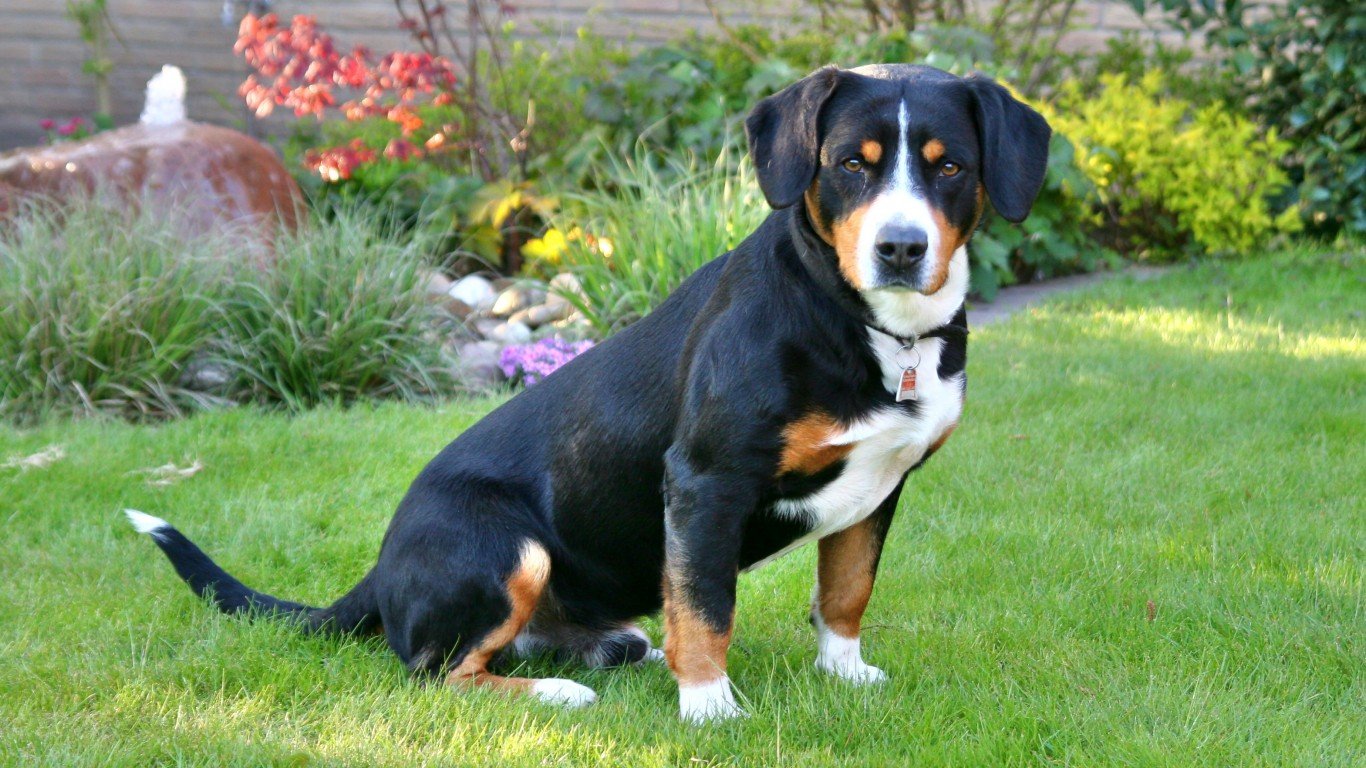
Entlebucher Mountain Dog
> Year recognized: 2011
> Current popularity rank: 173 out of 197
> Life expectancy: 11-13 years
Originating in Switzerland, the Entlebucher was used to herd cattle in the Alps. It is small, muscular, athletic, and agile. The Entlebucher has a beautiful coat — black with symmetrical white and tan markings — that requires minimum upkeep.
[in-text-ad-2]
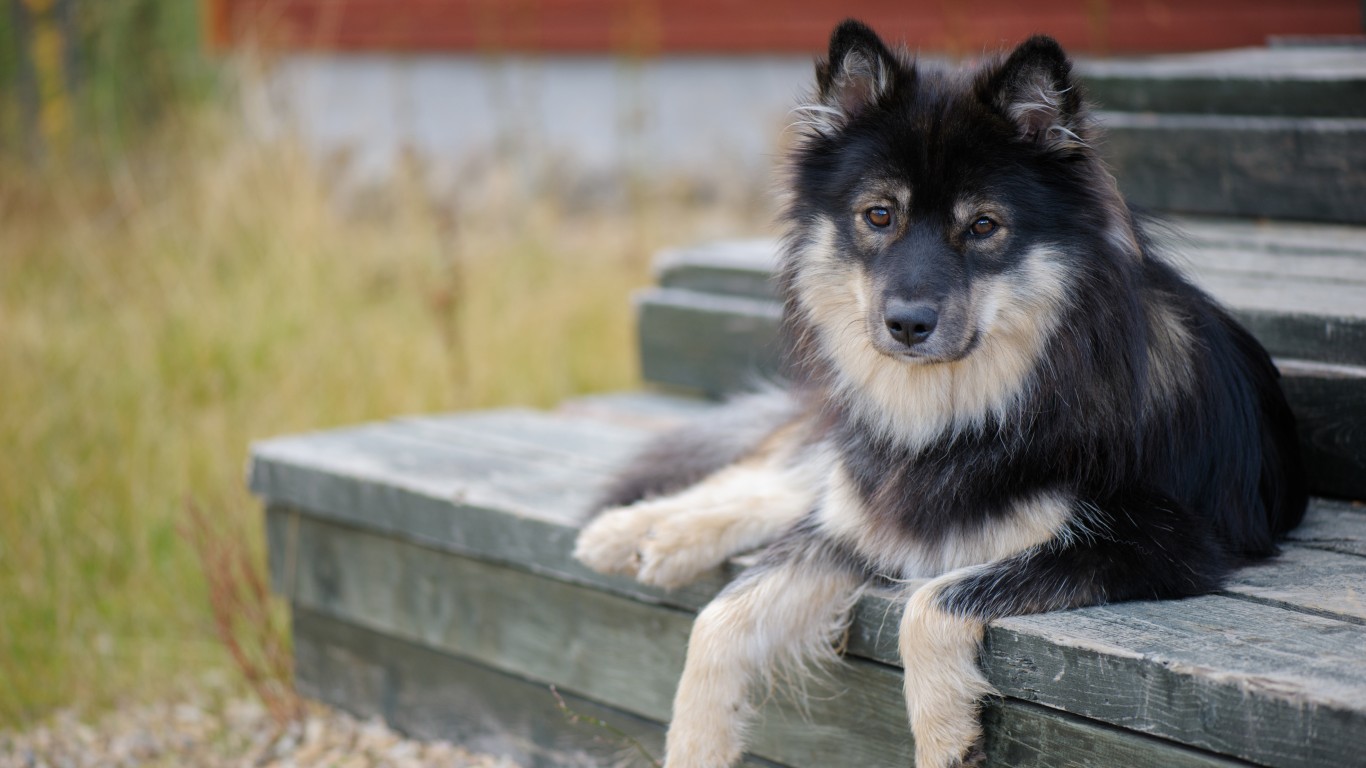
Finnish Lapphund
> Year recognized: 2011
> Current popularity rank: 168 out of 197
> Life expectancy: 12-15 years
The Finnish lapphund is an ancient breed that was used by indigenous people to herd reindeer. It has a tendency to bark, which makes it a good watchdog but also means it requires careful training. The lapphund is used as a therapy dog and in search and rescue.
American English Coonhound
> Year recognized: 2011
> Current popularity rank: 184 out of 197
> Life expectancy: 11-12 years
Bred to hunt raccoons and foxes, American English coonhounds have been around for centuries. George Washington, an avid fox hunter, may have been the first in the U.S. to have one. They are great hunters and can follow their prey up a tree.
[in-text-ad]
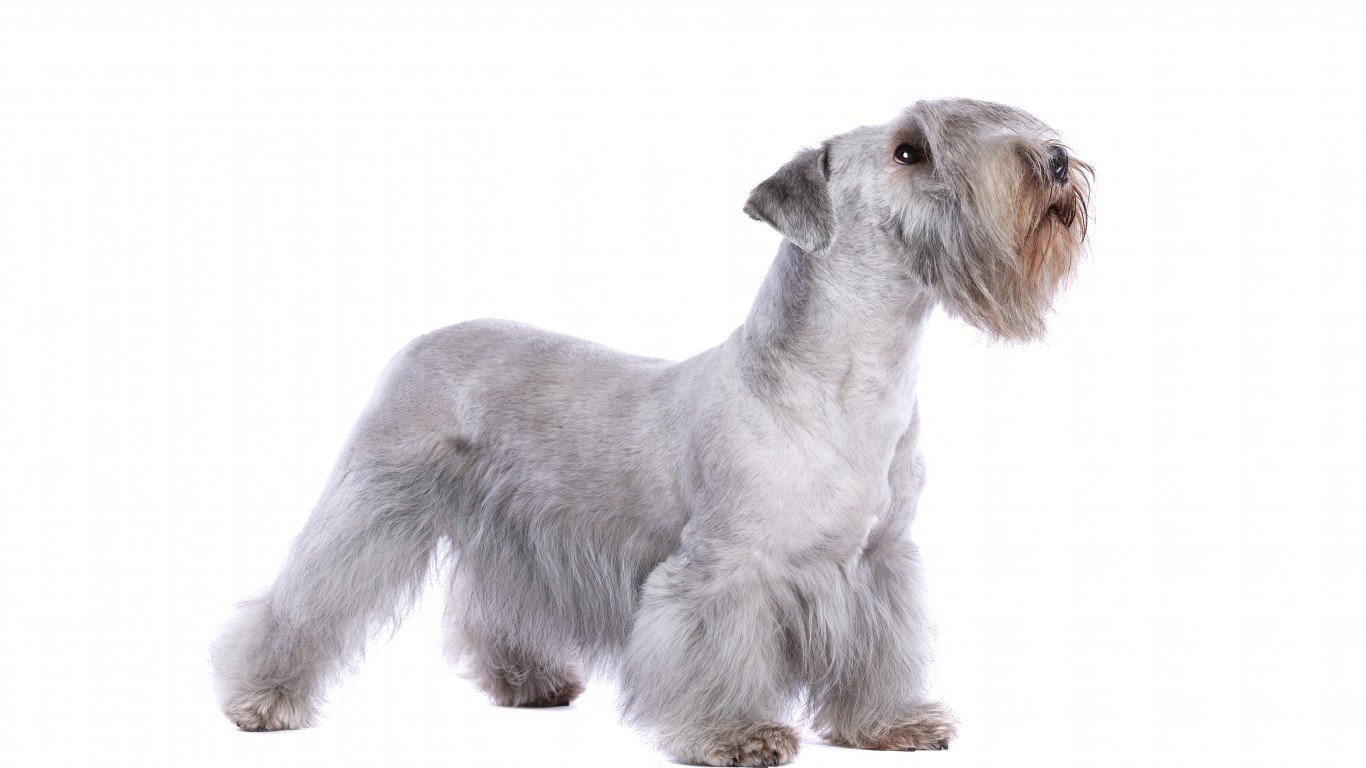
Cesky Terrier
> Year recognized: 2011
> Current popularity rank: 190 out of 197
> Life expectancy: 12-15 years
The Cesky terrier was first bred in 1949 by a Czech geneticist, who started with Scottish and Sealyham terriers. This little hunting dog has a long body and short legs. The Cesky terrier comes in two colors: blue-gray and light brown. It has a lot of facial hair and a long coat that requires regular grooming.
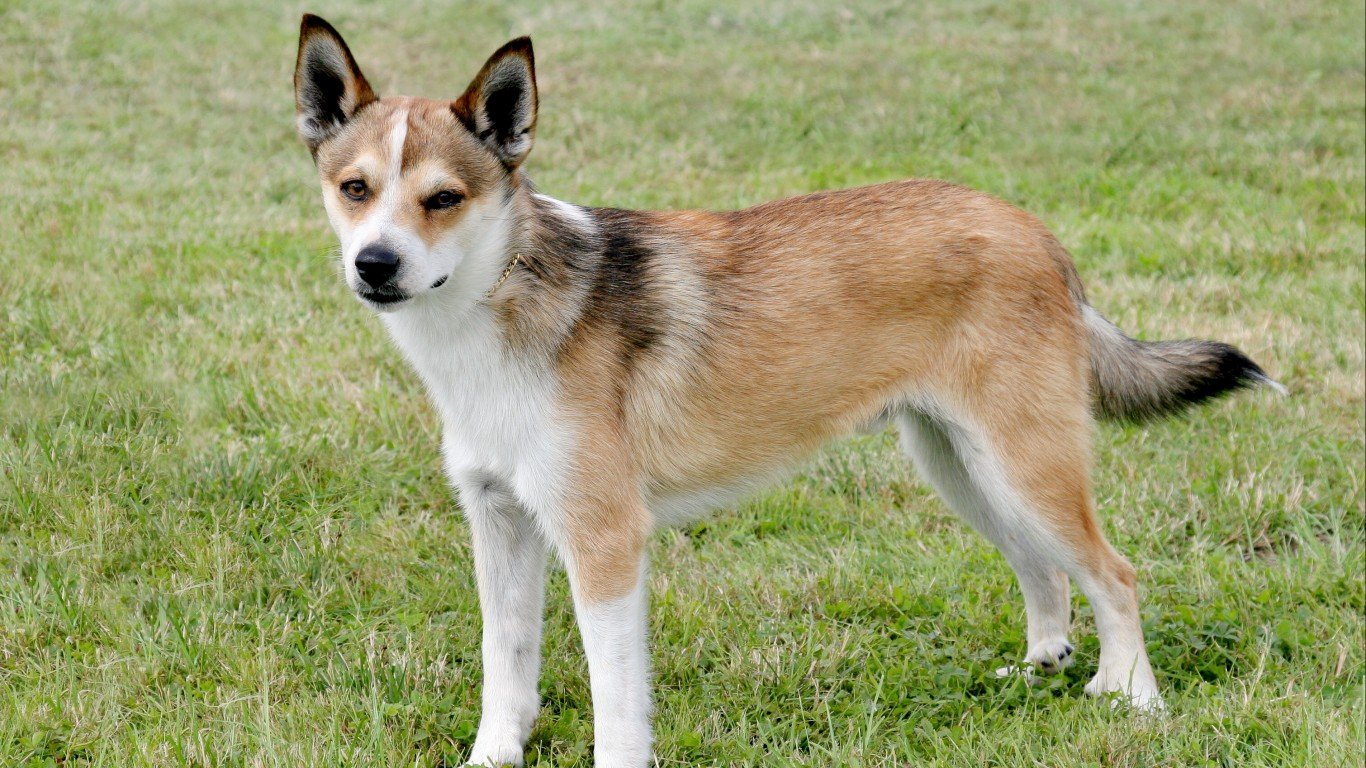
Norwegian Lundehund
> Year recognized: 2011
> Current popularity rank: 197 out of 197
> Life expectancy: 12-15 years
Also known as the Norwegian puffin dog, this breed was originally used to retrieve birds from steep cliffs on remote islands. It not only has extraordinary climbing abilities, but also some unique physical characteristics, including at least six toes on each foot and a remarkably flexible neck that enables it to turn around in narrow caves.
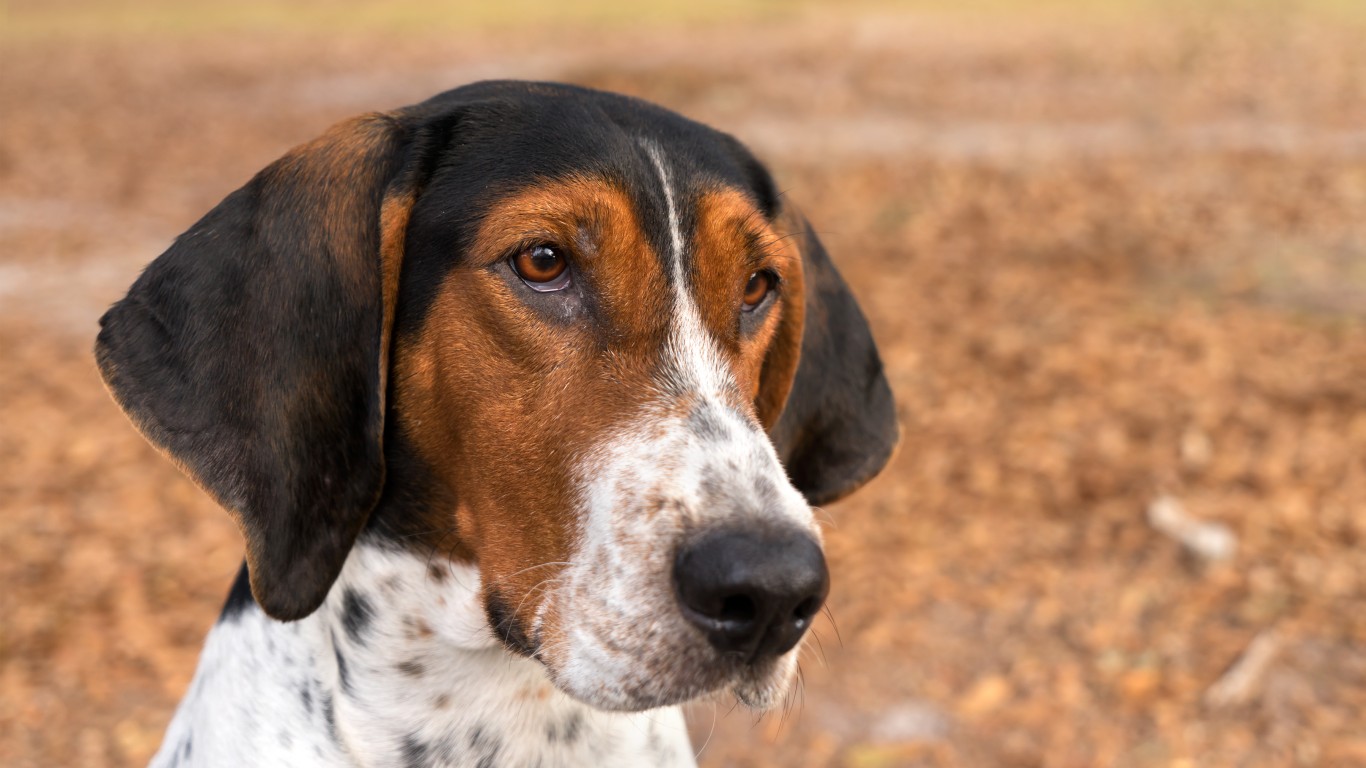
Treeing Walker Coonhound
> Year recognized: 2012
> Current popularity rank: 151 out of 197
> Life expectancy: 12-13 years
The treeing walker coonhound is another dog that was bred to hunt raccoons. In fact, it has been called the “people’s choice” of coonhounds. Its name — treeing walker coonhound — may be misleading as it is a very strong runner and has a competitive character.
[in-text-ad-2]

Russell Terrier
> Year recognized: 2012
> Current popularity rank: 72 out of 197
> Life expectancy: 12-14 years
The Russell terrier breed originated in England and was developed in Australia. It is a strong working dog and requires lots of exercise. It is also very intelligent and good at tricks. The Russell terrier has a weatherproof coat that can be smooth, broken, or rough.
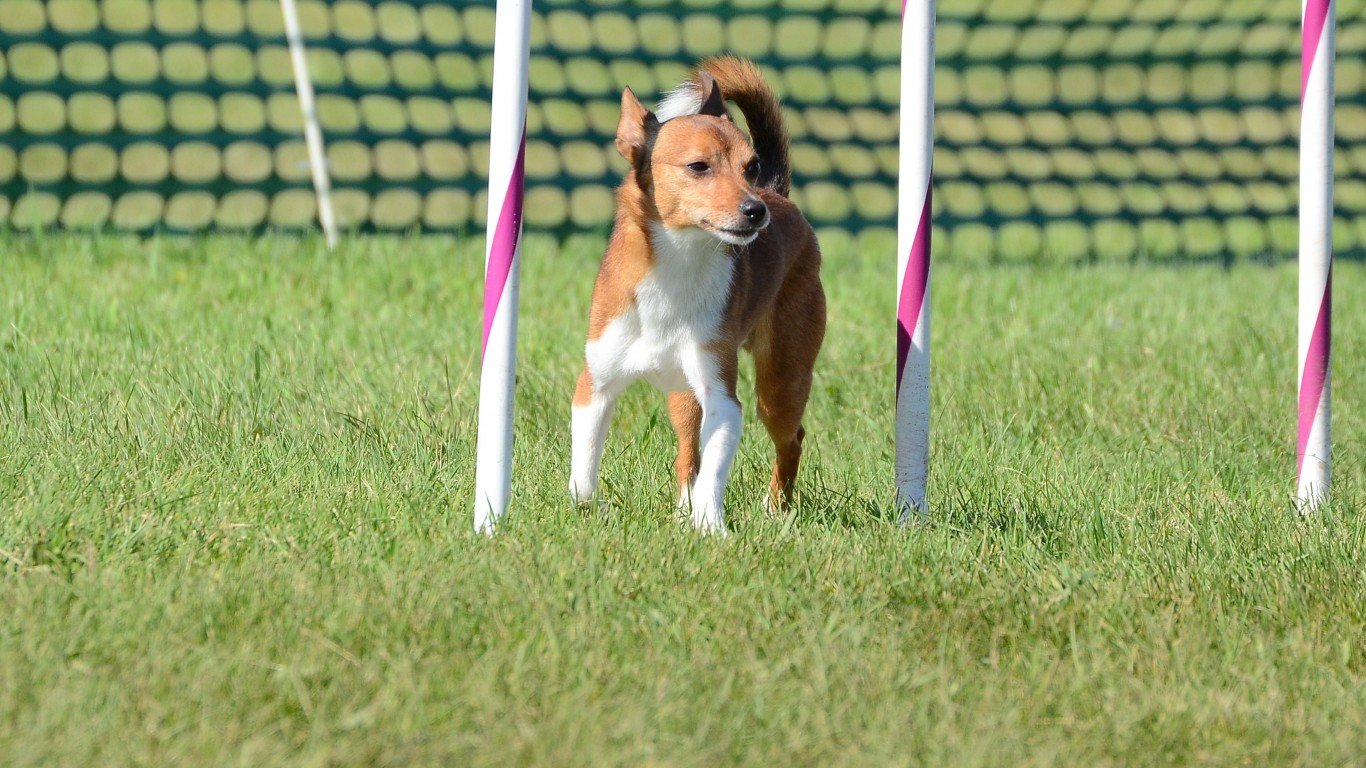
Portuguese Podengo Pequeno
> Year recognized: 2013
> Current popularity rank: 162 out of 197
> Life expectancy: 12-15 years
The podengo was bred as a hunting dog in its native Portugal and was well adapted to harsh terrain. It was also used by explorers to rid ships of vermin and to catch game when they made landfall. The breed comes in pequeno (small), médio (medium), and grande (large) sizes. It can have a wire coat or a smooth coat, the latter more popular historically.
[in-text-ad]

Chinook
> Year recognized: 2013
> Current popularity rank: 172 out of 197
> Life expectancy: 12-15 years
The official state dog of New Hampshire, the Chinook was developed as a sled dog by polar explorer Arthur Treadwell Walden in the early 1900s. One of the pups in the first litter was named Chinook, and today all of the members of this rare breed are descended from him.
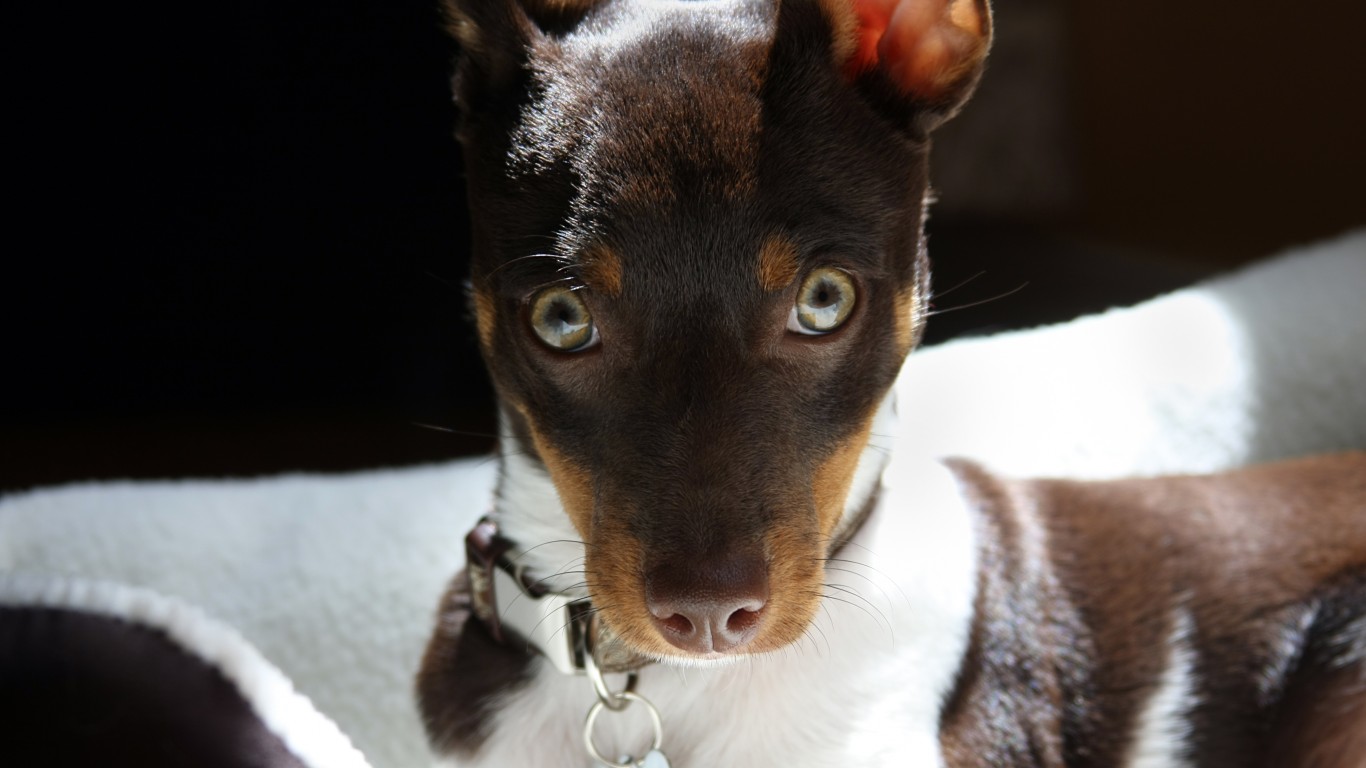
Rat Terrier
> Year recognized: 2013
> Current popularity rank: 86 out of 197
> Life expectancy: 12-18 years
The rat terrier was bred to hunt vermin and for farm work. It is energetic and needs exercise. It is intelligent and trainable and does well in agility and obedience events. Its coat has a pied pattern that comes in various colors in combination with white.
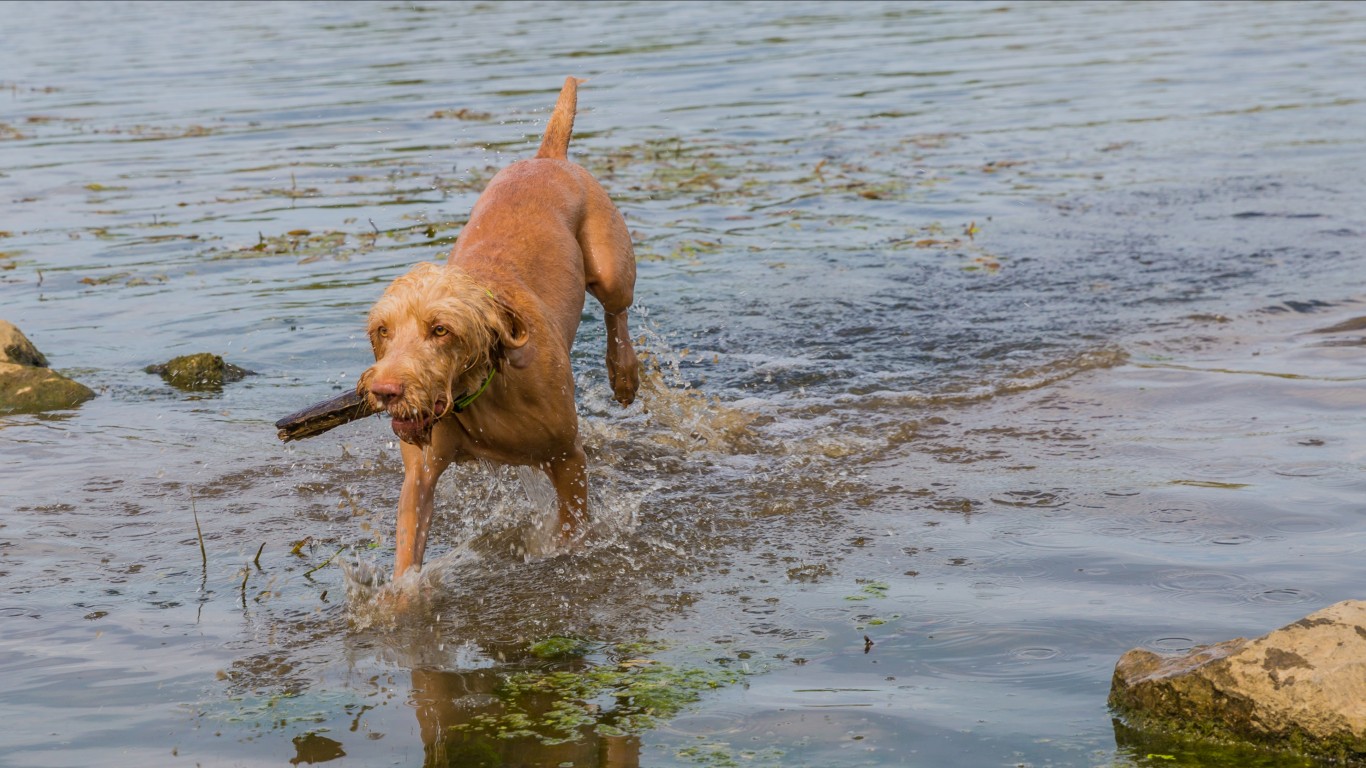
Wirehaired Vizsla
> Year recognized: 2014
> Current popularity rank: 144 out of 197
> Life expectancy: 12-14 years
The wirehaired vizsla was first developed in Hungary in the 1930s. Hunters wanted a dog with the traits of the vizsla breed, but heavier and with a wiry coat to better suit the rough conditions. The breed was imported to North America in the 1970s and appealed to sportsmen who wanted a good but different gundog. The breed’s distinguishing features include its beard and eyebrows.
[in-text-ad-2]

Coton de Tuléar
> Year recognized: 2014
> Current popularity rank: 83 out of 197
> Life expectancy: 15-19 years
The coton de Tuléar is also known as the Royal Dog of Madagascar. “Coton” is the French word for cotton, which the breed’s white coat resembles; and Tuléar is a town in Madagascar. Coton de Tulear is a companion dog, an AKC designation that certifies a dog is able to perform obedience tasks. It is small but sturdy, with an expressive face and a hypoallergenic coat.
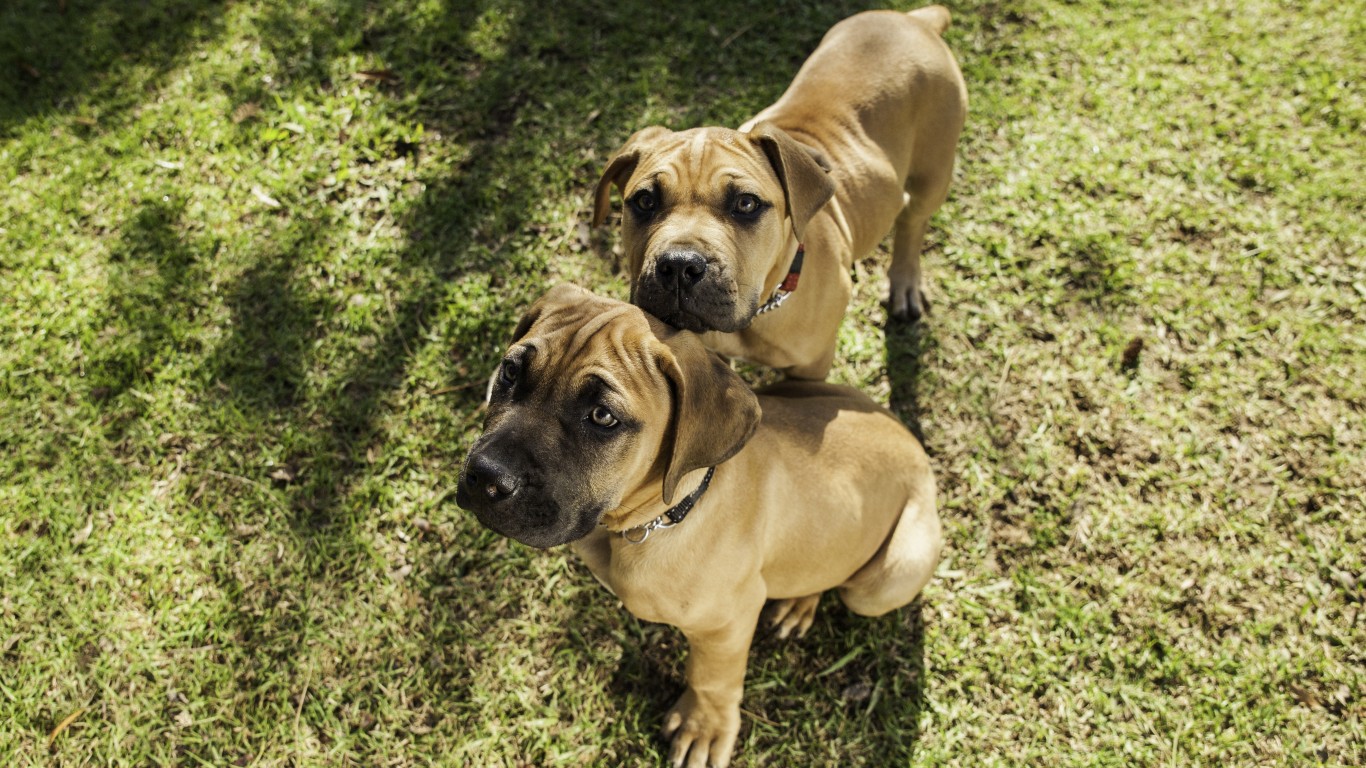
Boerboel
> Year recognized: 2015
> Current popularity rank: 118 out of 197
> Life expectancy: 9-11 years
The Boerboel was developed as a farm dog in South Africa. It is a mastiff type, strong and muscular in appearance, and can weigh up to 200 pounds. It is also dominant, so new owners should have experience handling large dogs.
[in-text-ad]
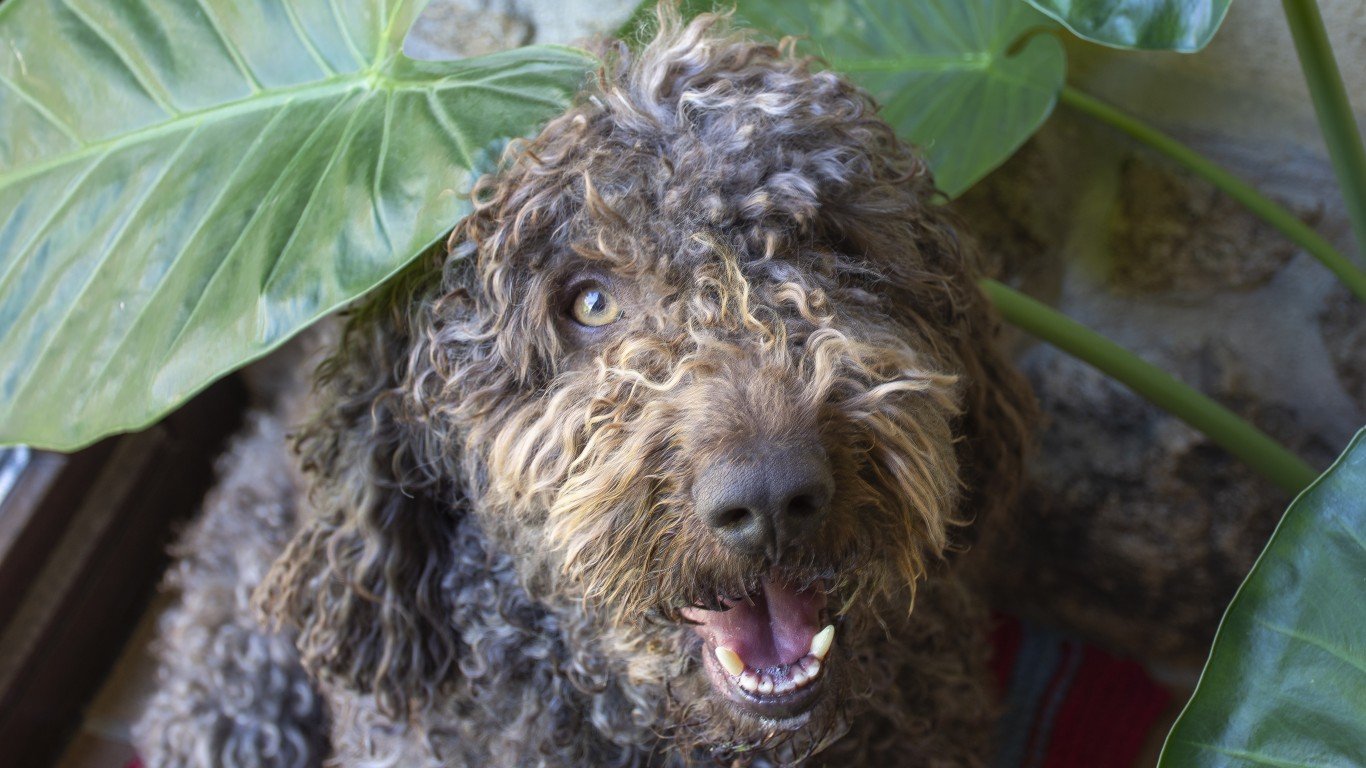
Spanish Water Dog
> Year recognized: 2015
> Current popularity rank: 145 out of 197
> Life expectancy: 12-14 years
Despite its name, this isn’t really a water dog but was developed to herd and protect livestock. In fact, it will herd anything that moves — even children! The Spanish water dog has a curly coat that covers its entire body, including its eyes, giving it a resemblance to the poodle.
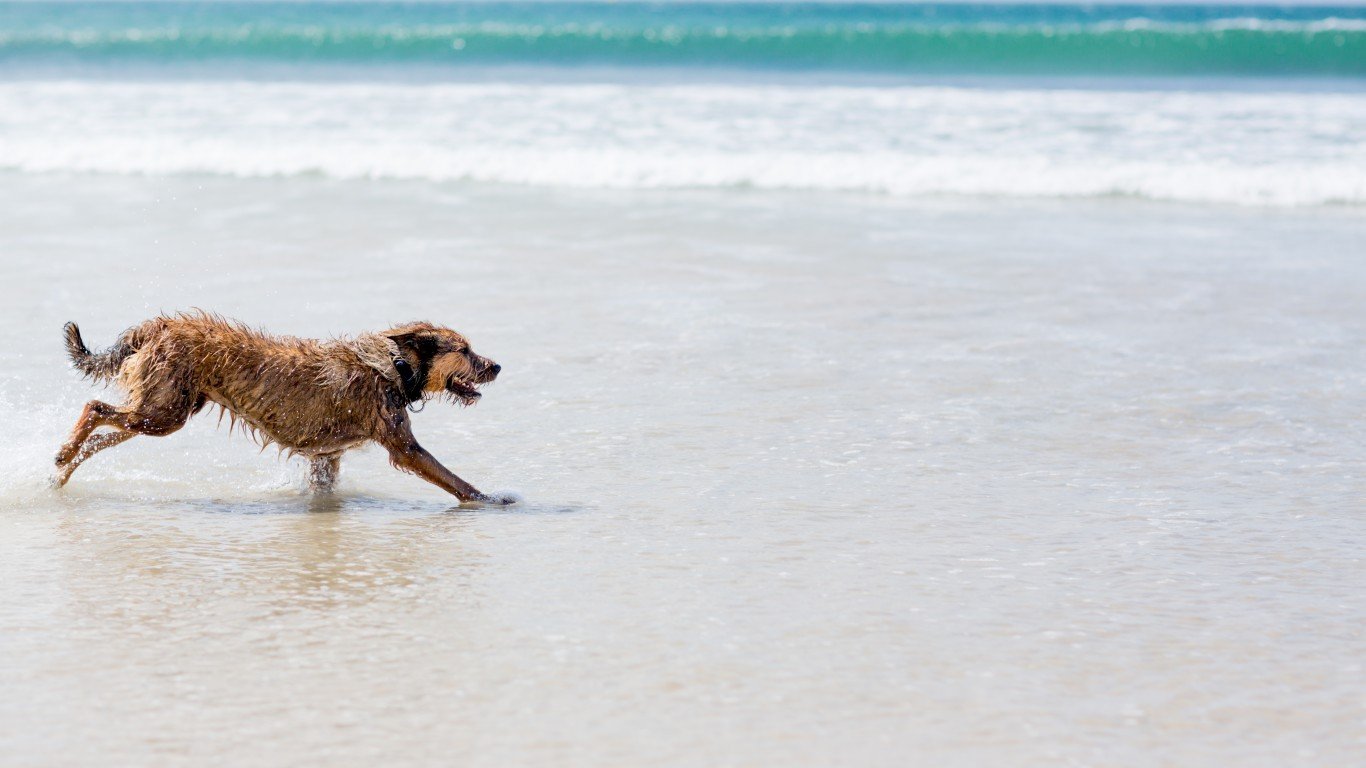
Berger Picard
> Year recognized: 2015
> Current popularity rank: 163 out of 197
> Life expectancy: 12-13 years
The berger Picard is one of the oldest French sheepdog breeds. It needs a lot of exercise but should be kept on a leash as it has a vigorous prey drive. A berger Picard was featured in the movie “Because of Winn-Dixie” and the Berger Picard Club of North America was formed shortly after the film’s premiere in 2005.
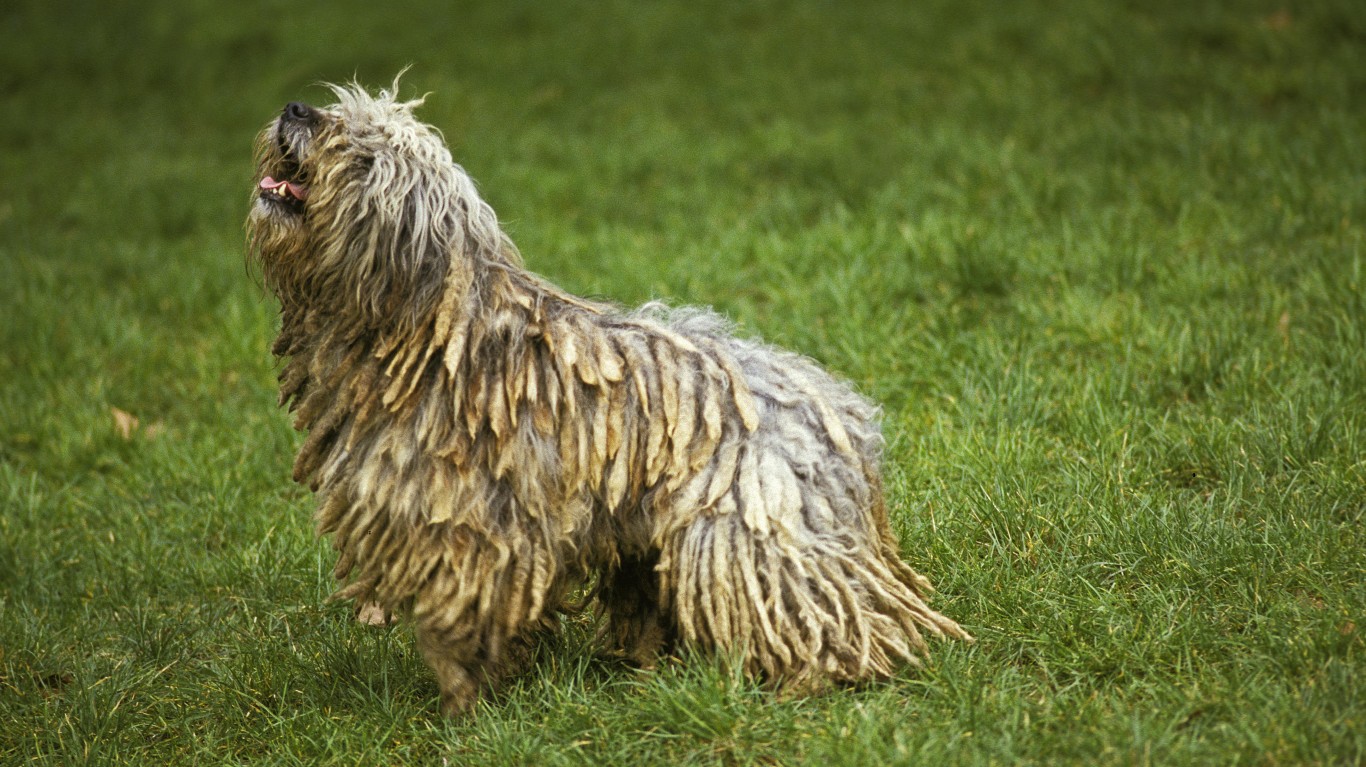
Bergamasco
> Year recognized: 2015
> Current popularity rank: 179 out of 197
> Life expectancy: 13-15 years
Though the Bergamasco is a sheepdog with origins in the Middle East, it has long been associated with, and gets its name from, the town of Bergamo in the Italian Alps. The breed’s most distinctive feature is its coat, which consists of hair of three different textures layered over its body and legs. This protects it from the elements and from predators.
[in-text-ad-2]
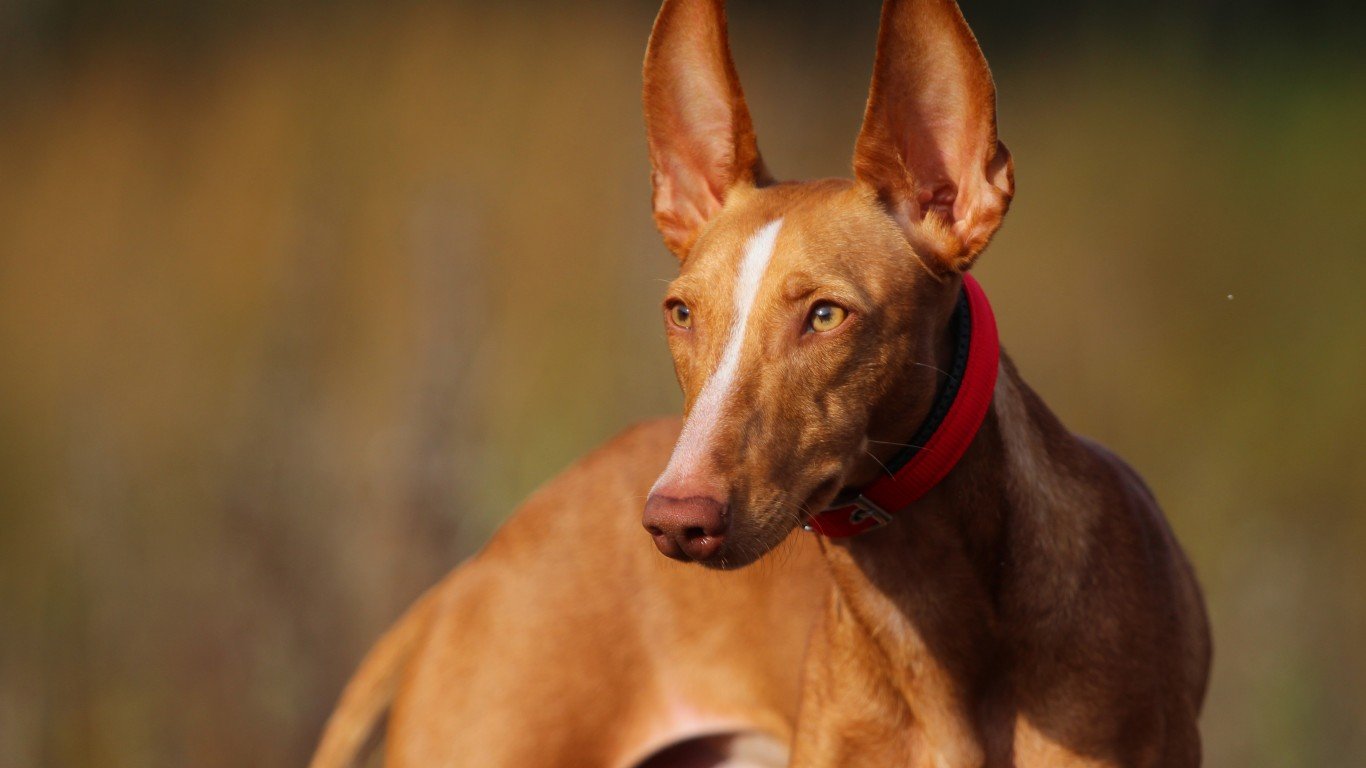
Cirneco dell’Etna
> Year recognized: 2015
> Current popularity rank: 183 out of 197
> Life expectancy: 12-14 years
The cirneco dell’Etna is a rabbit-hunting dog found all over Sicily, including the area around the volcano from which it takes its name. It is an ancient breed that has changed little over the years. It has good scent, sight, and hearing and is free from inherited health problems.

Miniature American Shepherd
> Year recognized: 2015
> Current popularity rank: 30 out of 197
> Life expectancy: 12-13 years
The miniature American shepherd was developed in California in the 1960s and was originally called the miniature Australian shepherd. It has been used to herd small stock such as sheep and goats, and its own small size and temperament makes it a good household pet and travel companion.
[in-text-ad]
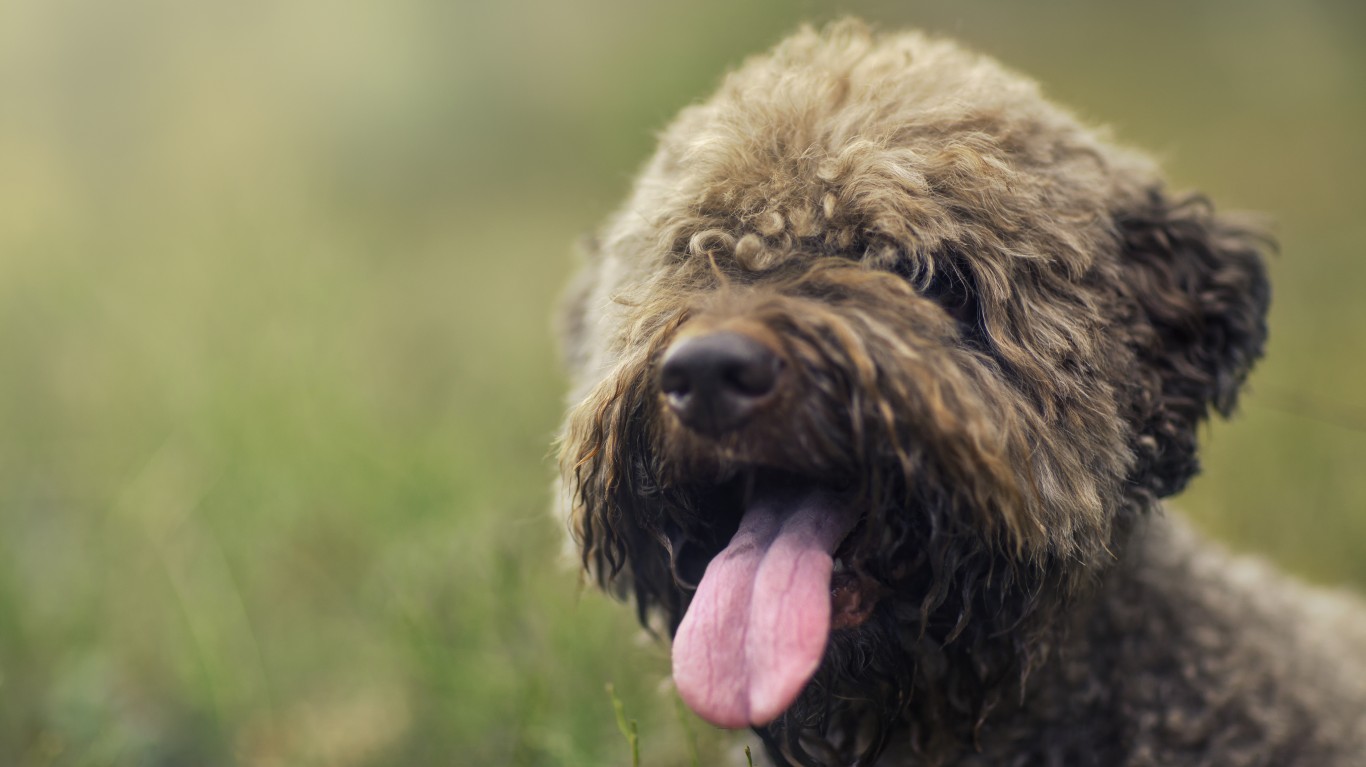
Lagotto Romagnolo
> Year recognized: 2015
> Current popularity rank: 79 out of 197
> Life expectancy: 15-17 years
The lagotto romagnolo originated in Italy, where it has been used to hunt waterfowl and truffles. Its hunting skills mean it has also been used in search and rescue. The lagotto Romagnolo can be shy, so socialization is very important, particularly during the early weeks of its life. As a working dog it needs regular mental stimulation and physical exercise.
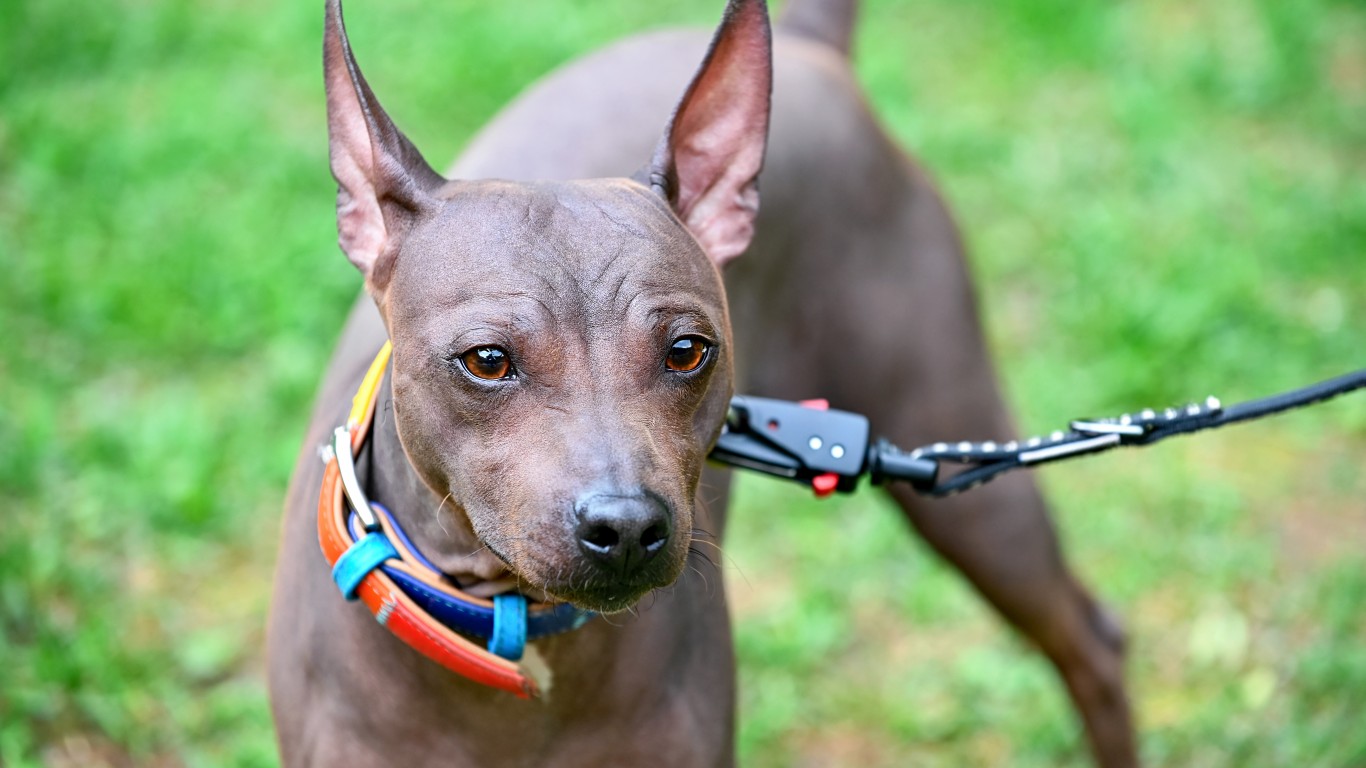
American Hairless Terrier
> Year recognized: 2016
> Current popularity rank: 135 out of 197
> Life expectancy: 14-16 years
This breed first appeared in 1972, when a hairless puppy was born in a litter of rat terriers in Louisiana. A breeding program of the hairless pup led ultimately to registration by the AKC in 2016. In fact, it’s the first hairless breed to have originated in the U.S. The lack of hair means it’s not suitable for hunting or ratting, but it does make an excellent watchdog.
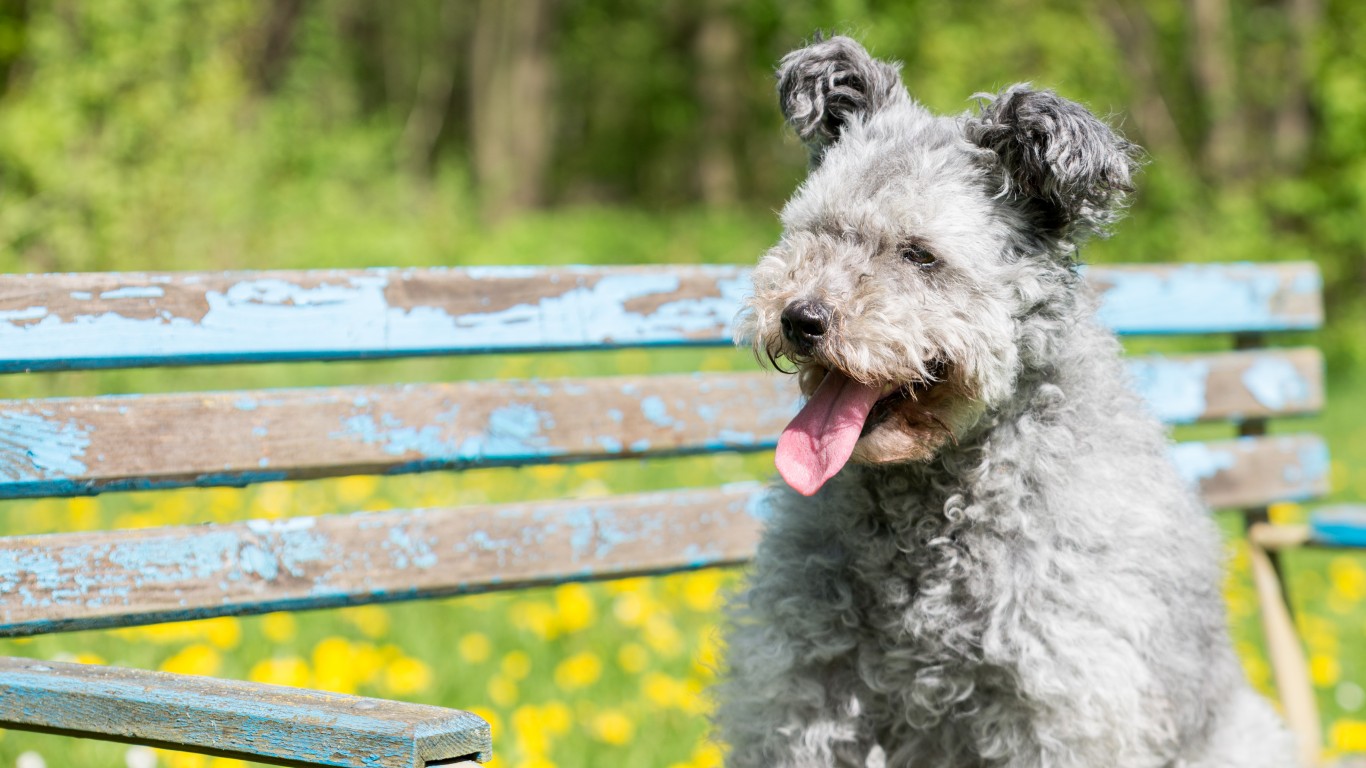
Pumi
> Year recognized: 2016
> Current popularity rank: 153 out of 197
> Life expectancy: 12-13 years
The pumi was originally bred in Hungary to herd sheep and semi-wild livestock in rugged conditions. It is very energetic and excels at dog sports. It doesn’t shed, but it does need regular brushing and combing. The pumi is relatively rare in the U.S., where only a few litters are born each year.
[in-text-ad-2]
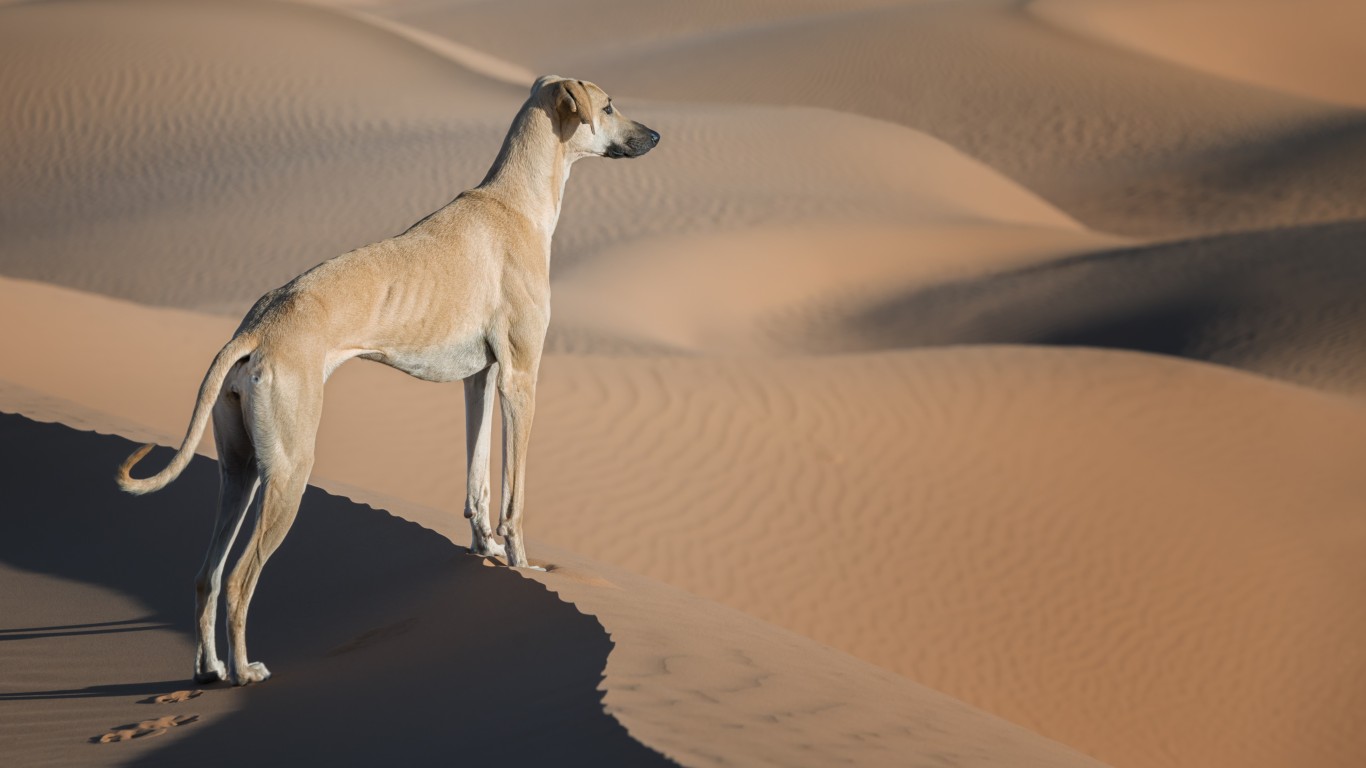
Sloughi
> Year recognized: 2016
> Current popularity rank: 193 out of 197
> Life expectancy: 12-14 years
The sloughi, also known as the Arabian greyhound, is a sighthound breed (a dog that hunts by sight rather than scent) that originated in North Africa. Similar dogs were prized in ancient Egypt and given as tributes to the Pharaohs. The sloughi is known for its speed, agility, and endurance, and it is relentless in pursuing prey.
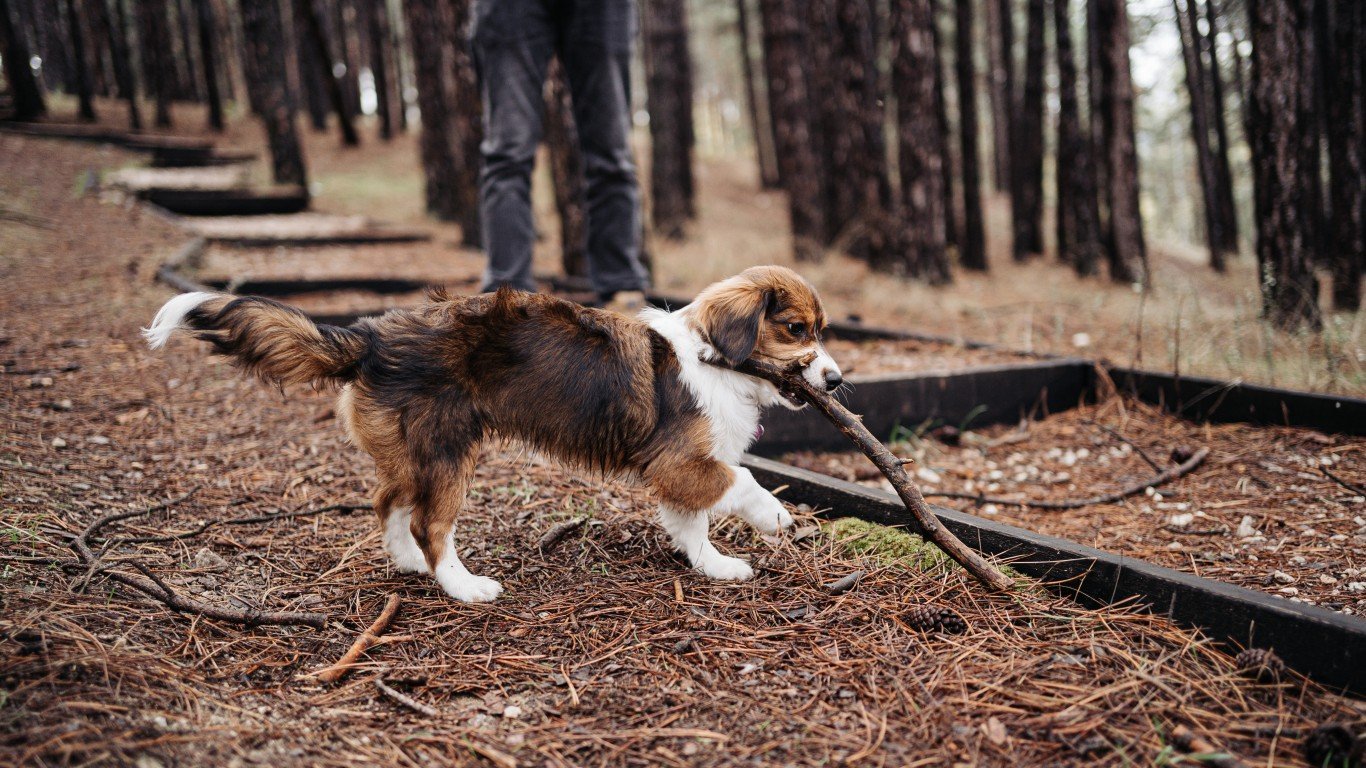
Nederlandse Kooikerhondje
> Year recognized: 2018
> Current popularity rank: 156 out of 197
> Life expectancy: 12-15 years
The Nederlandse kooikerhondje is known as the “little white and orange dog with a big heart” because of its color and temperament. It was used by hunters to lure ducks into cages (its name literally means “duck hunter’s small dog”). It might have died out but for the efforts of a Dutch noblewoman, Baronesse von Hardenbroek van Ammerstol, during and after World War II. The breed was officially recognized by the Raad van Beheer (the Dutch equivalent of AKC) in 1971.
[in-text-ad]

Grand Basset Griffon Vendéen
> Year recognized: 2018
> Current popularity rank: 189 out of 197
> Life expectancy: 13-15 years
The grand basset griffon Vendéen is a scenthound that originated in the Vendéen region of France. It has a shaggy coat, complemented by a shaggy mustache, beard, and eyebrows. It is a low-set dog with short legs, bred so that hunters on foot could keep up with it.
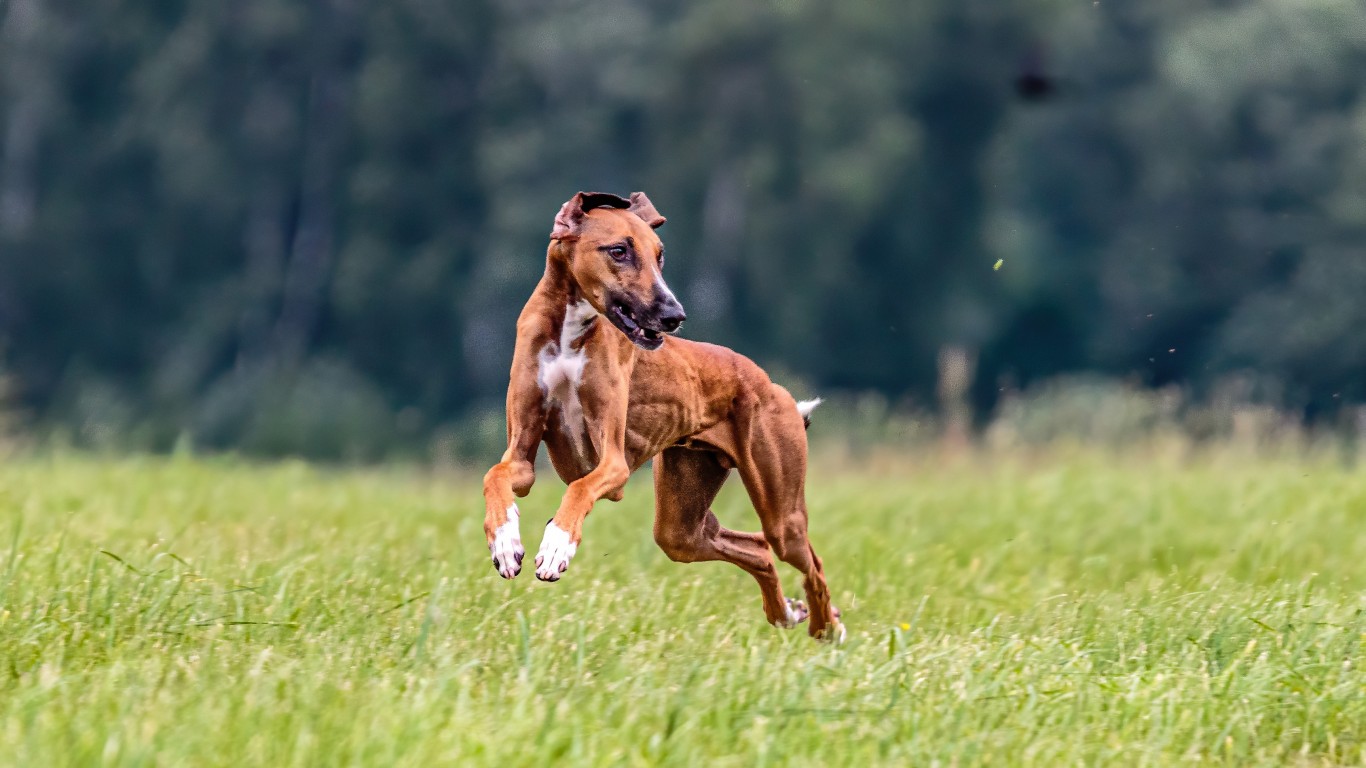
Azawakh
> Year recognized: 2019
> Current popularity rank: 185 out of 197
> Life expectancy: 12-15 years
The azawakh is a sighthound and a sprinter that originated in West Africa. It was used by Tuareg nomads to hunt hare, antelope, wild boar, and other prey and to protect camps and flocks, and it was regarded as a member of the family. The azawakh is a lean dog with long legs and a very fine coat.
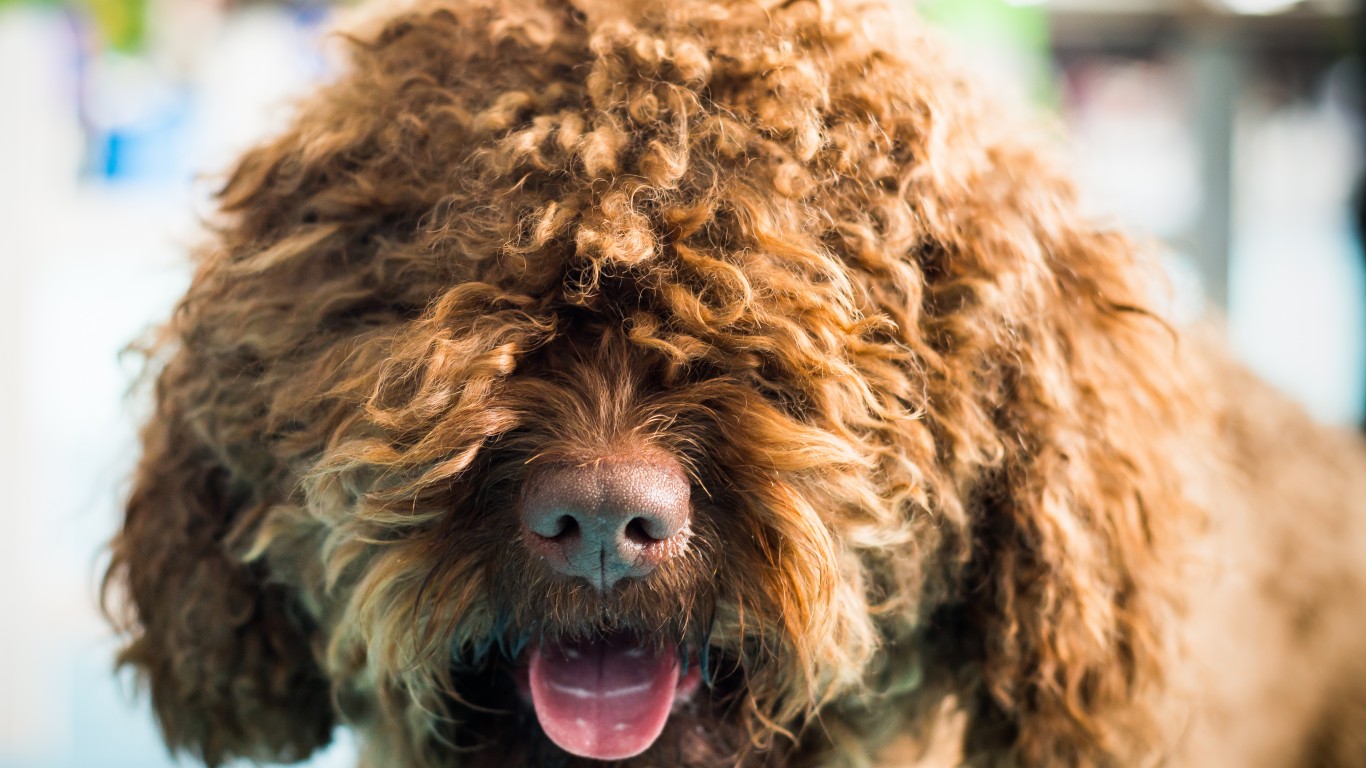
Barbet
> Year recognized: 2020
> Current popularity rank: 148 out of 197
> Life expectancy: 12-14 years
This French water dog was used to locate, flush, and retrieve birds hundreds of years ago, but it was only recognized by the AKC this year. Its defining characteristic is a dense curly coat that runs the full length of its body to the tip of its tail. The barbet is athletic, intelligent, adaptable and devoted — in short a versatile dog.
[in-text-ad-2]

Dogo Argentino
> Year recognized: 2020
> Current popularity rank: 89 out of 197
> Life expectancy: 9-15 years
As its name suggests, the Dogo Argentino originated in Argentina. The breed was created by Antonio Nores MartÃnez, a doctor with a passion for dogs and for hunting. It is a powerful and athletic dog with a short, completely white coat. It is used to hunt wild boar and other formidable game and is very protective of those it loves. It is sometimes called the Argentinian mastiff.
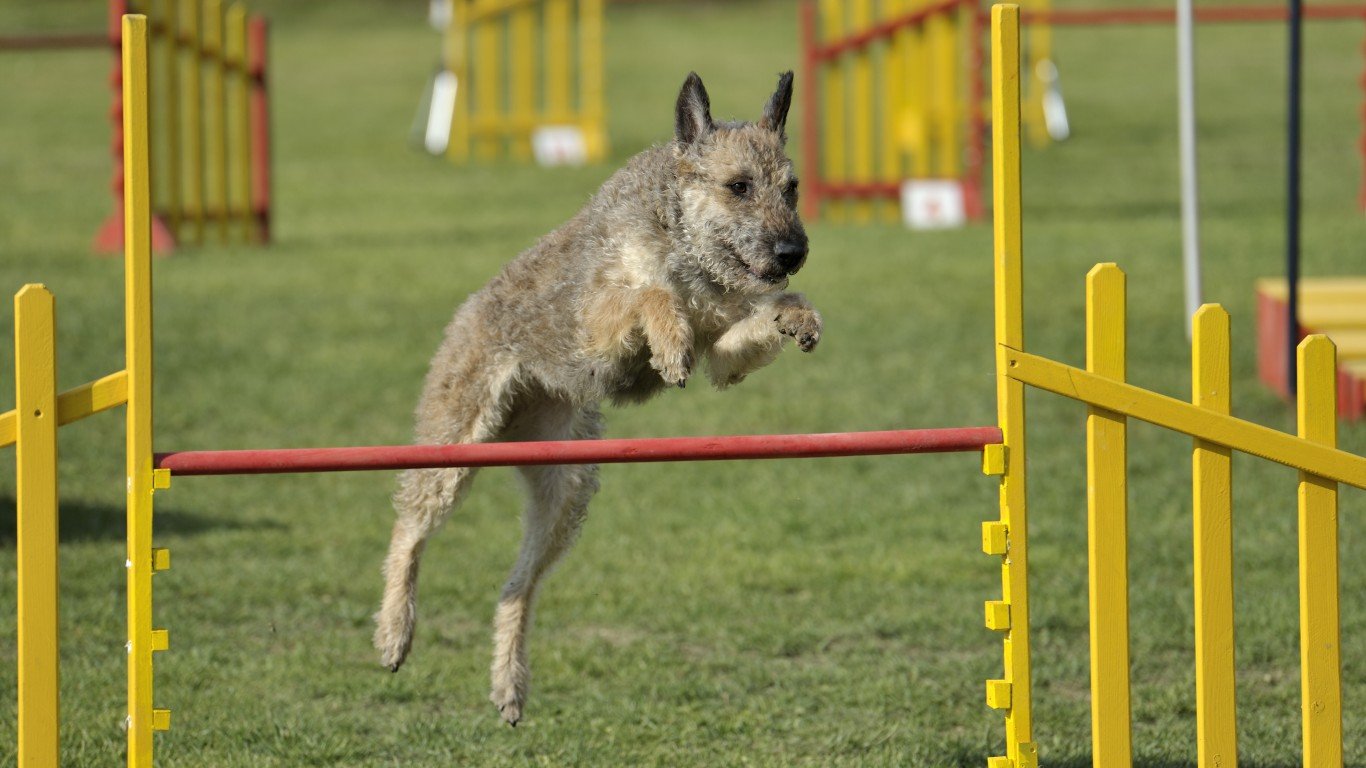
Belgian Laekenois
> Year recognized: 2020
> Current popularity rank: 194 out of 197
> Life expectancy: 10-12 years
The latest breed to gain recognition is the Belgian laekenois. The laekenois was added in July 2020. This dog makes for a great pet but needs more exercise than most dogs. Of the four officially recognized Belgian herding breeds, the Laekenois is the rarest. There have been fewer than 400 in the U.S. since 1995.
[in-text-ad]
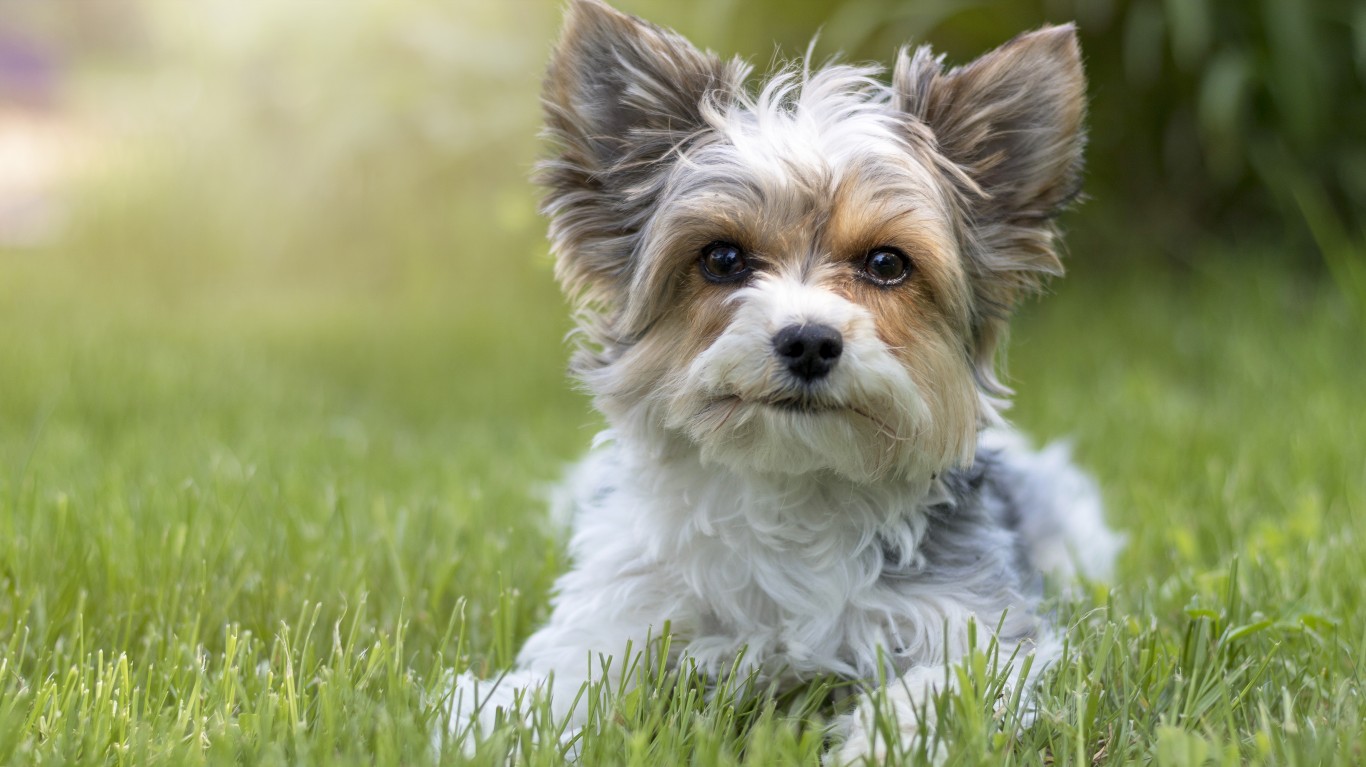
Biewer Terrier
> Year recognized: 2021
> Current popularity rank: 82 out of 197
> Life expectancy: 16 years
Before it was the biewer terrier, the dog was called German Yorkshire terrier. The dog can be traced back to the 1970s and to a German married couple who had decided to breed, raise, and sell Yorkshire terriers instead of having children.
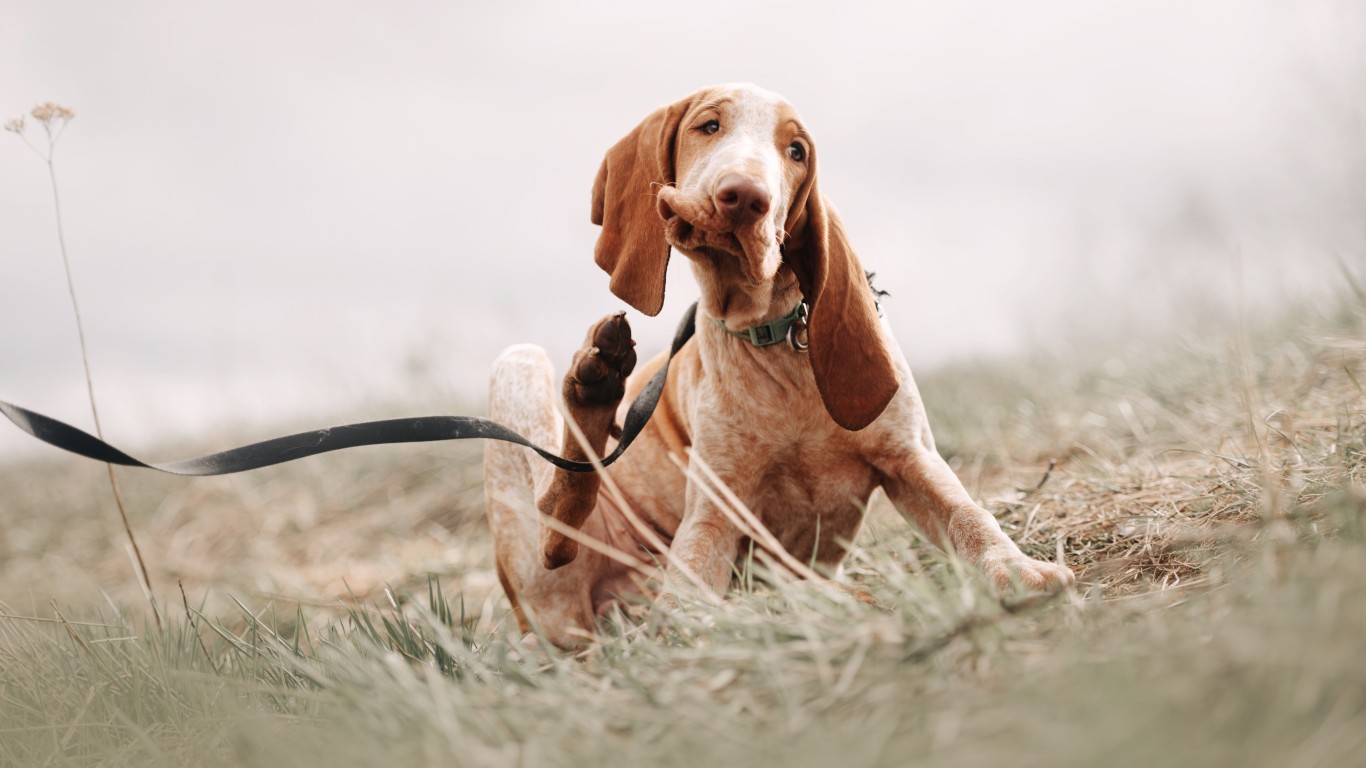
Bracco Italiano
> Year recognized: 2022
> Current popularity rank: N/A out of 197
> Life expectancy: 10-14 years years
Known in English as Italian pointing dogs or Italian pointers, these hunting dogs are very sweet family companions. They have endless energy, especially when in the field, making them a perfect match for active kids.
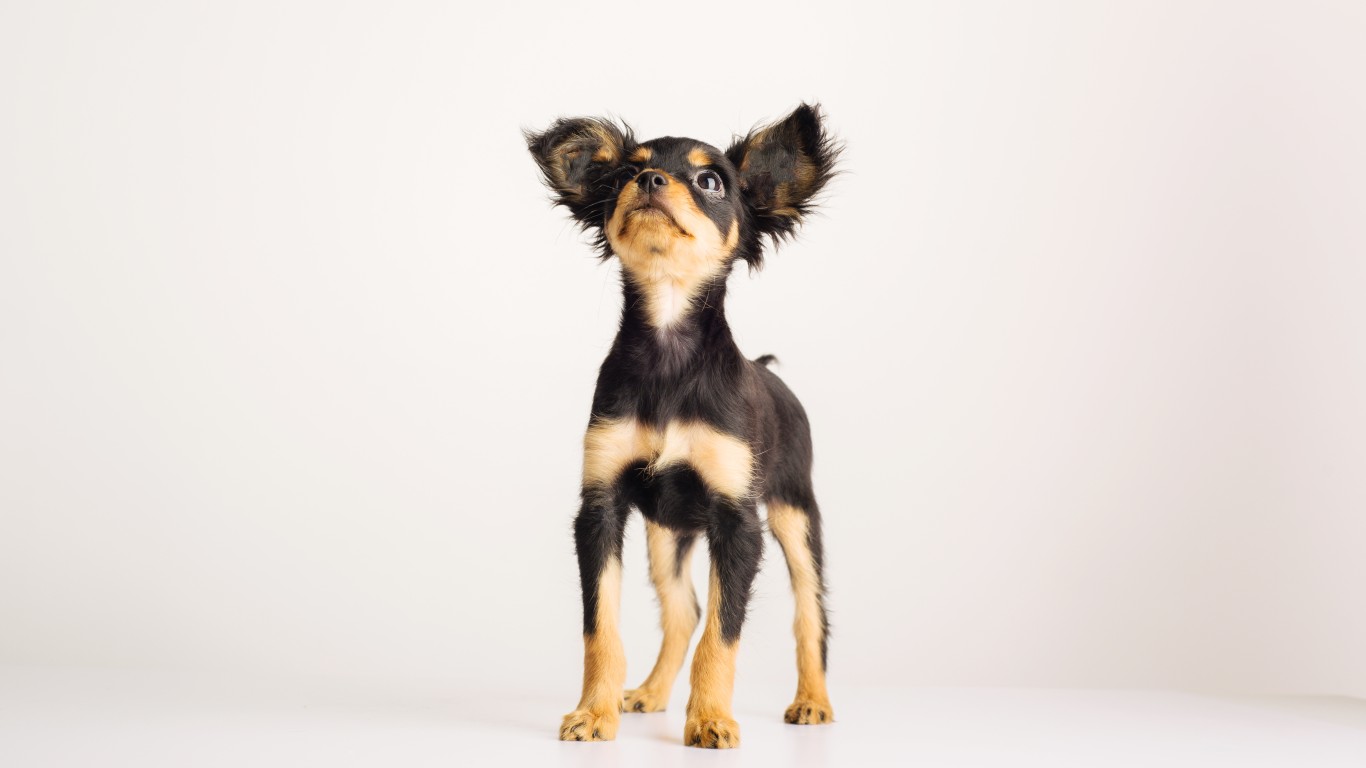
Russian Toy
> Year recognized: 2022
> Current popularity rank: N/A out of 197
> Life expectancy: 12-14 years years
As its name suggests, the Russian toy is a very small breed of dog originally from Russia. Bred from the English toy terrier in the early 18th century the wealthy, Russian toy dogs, which were a symbol of high status in society, were nearly exterminated during the 1917 revolution. Breeding them resumed in the late 1950s.
[in-text-ad-2]
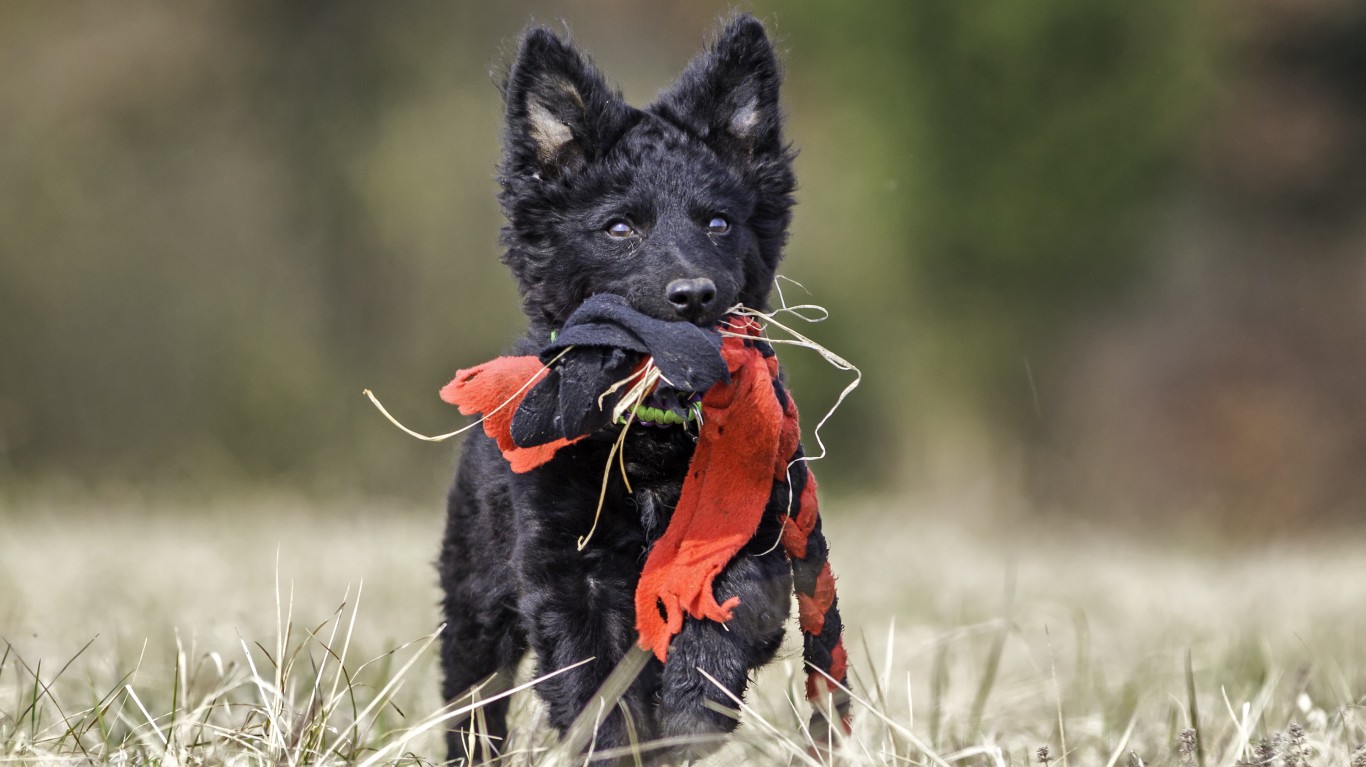
Mudi
> Year recognized: 2022
> Current popularity rank: N/A out of 197
> Life expectancy: 12-14 years years
The mudi — a spitz type dog that is a close cousin of the puli and pumi — is a herding dog breed from Hungary. This particular medium-sized breed has been around since the 19th century. There are not a lot of mudis around the world – certainly not many outside of Hungary, according to the AKC.
Take This Retirement Quiz To Get Matched With A Financial Advisor (Sponsored)
Take the quiz below to get matched with a financial advisor today.
Each advisor has been vetted by SmartAsset and is held to a fiduciary standard to act in your best interests.
Here’s how it works:
1. Answer SmartAsset advisor match quiz
2. Review your pre-screened matches at your leisure. Check out the
advisors’ profiles.
3. Speak with advisors at no cost to you. Have an introductory call on the phone or introduction in person and choose whom to work with in the future
Take the retirement quiz right here.
Thank you for reading! Have some feedback for us?
Contact the 24/7 Wall St. editorial team.
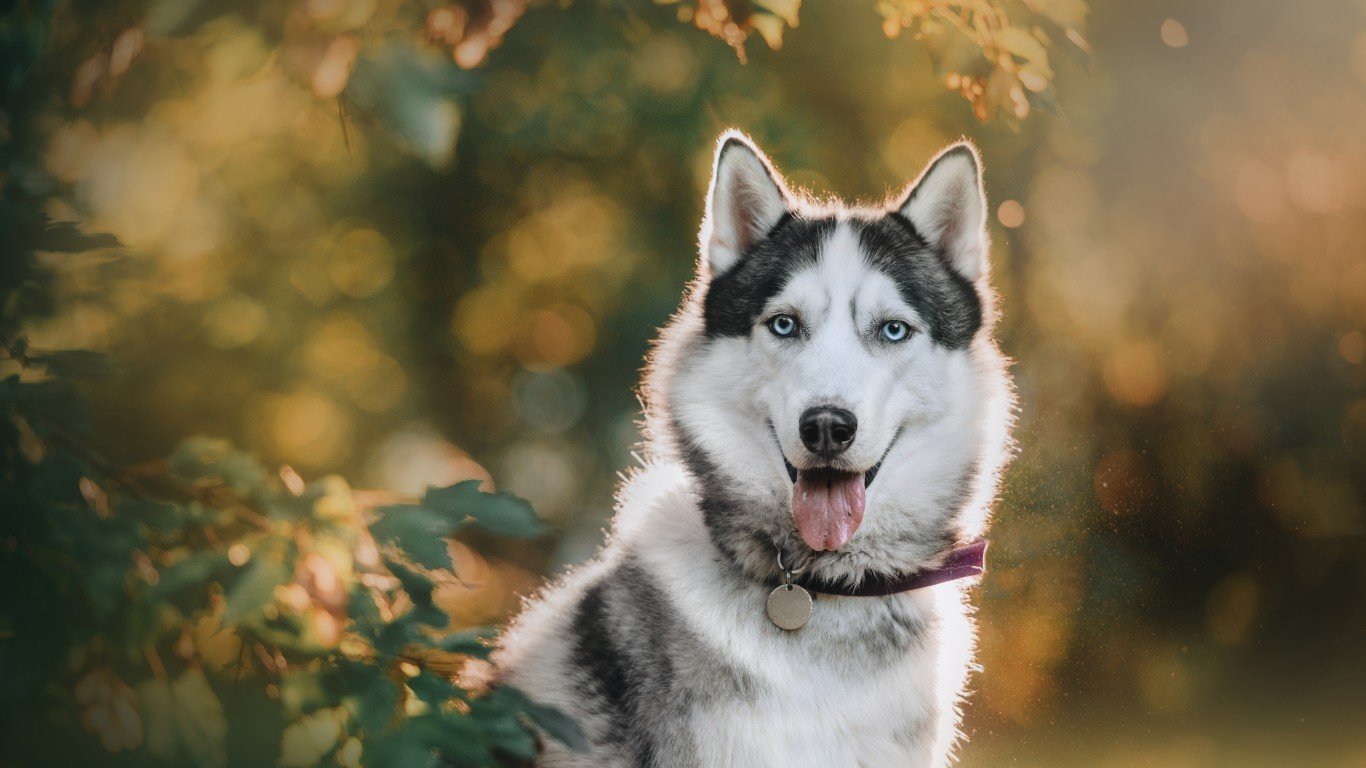 24/7 Wall St.
24/7 Wall St.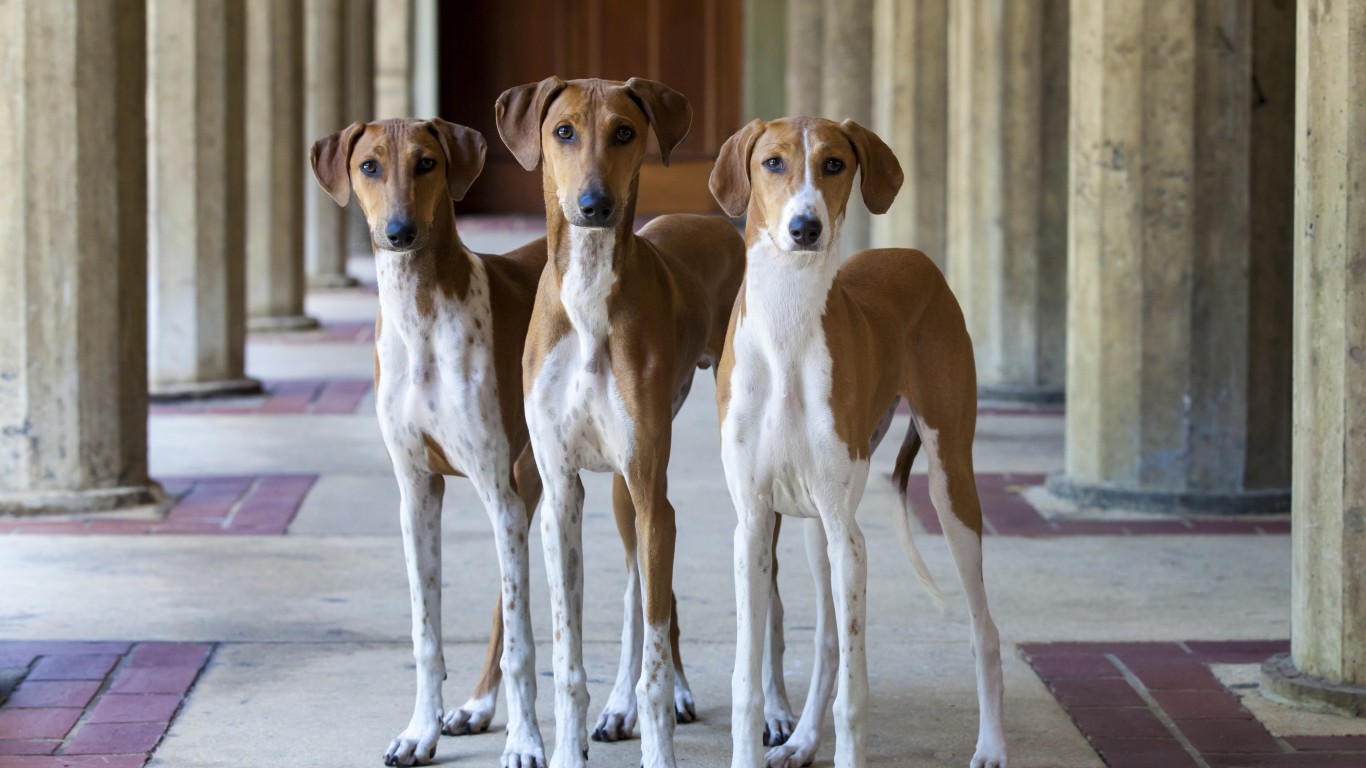 24/7 Wall St.
24/7 Wall St. 24/7 Wall St.
24/7 Wall St.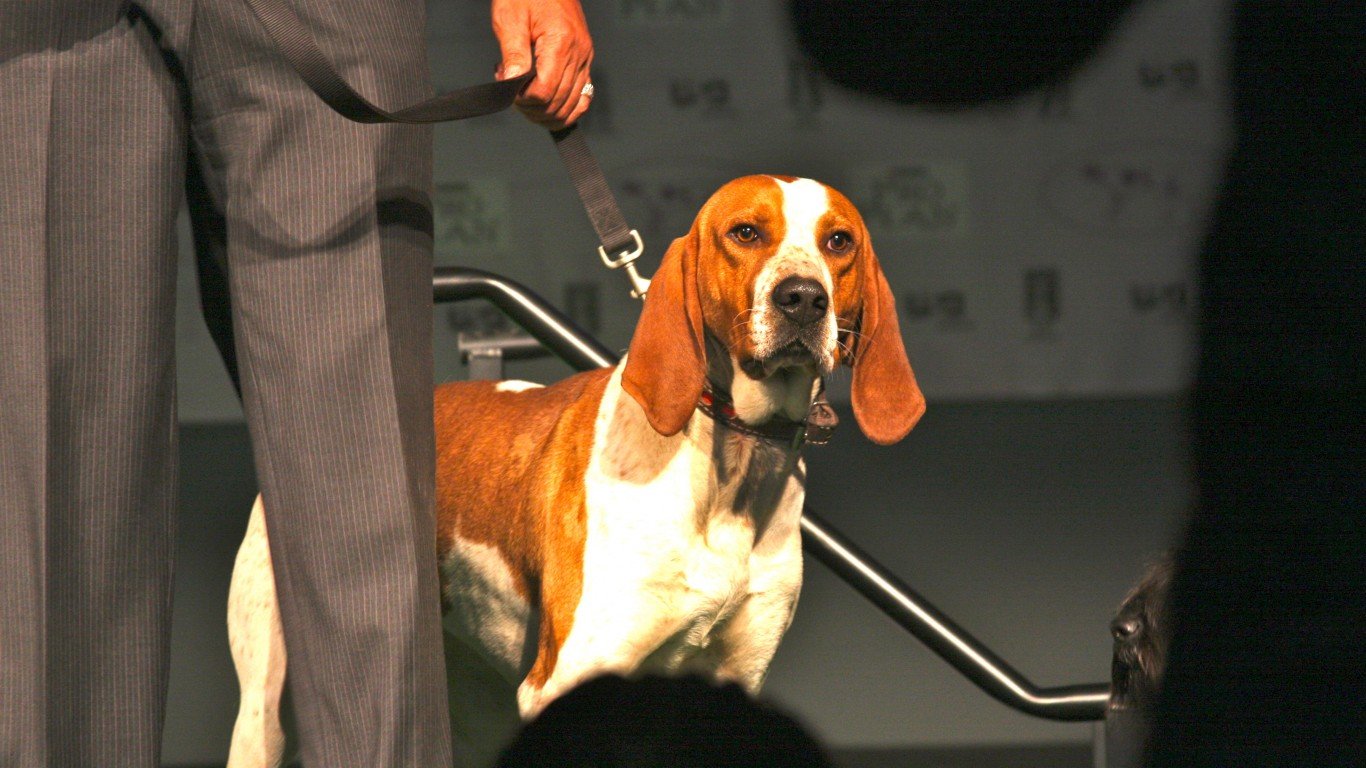
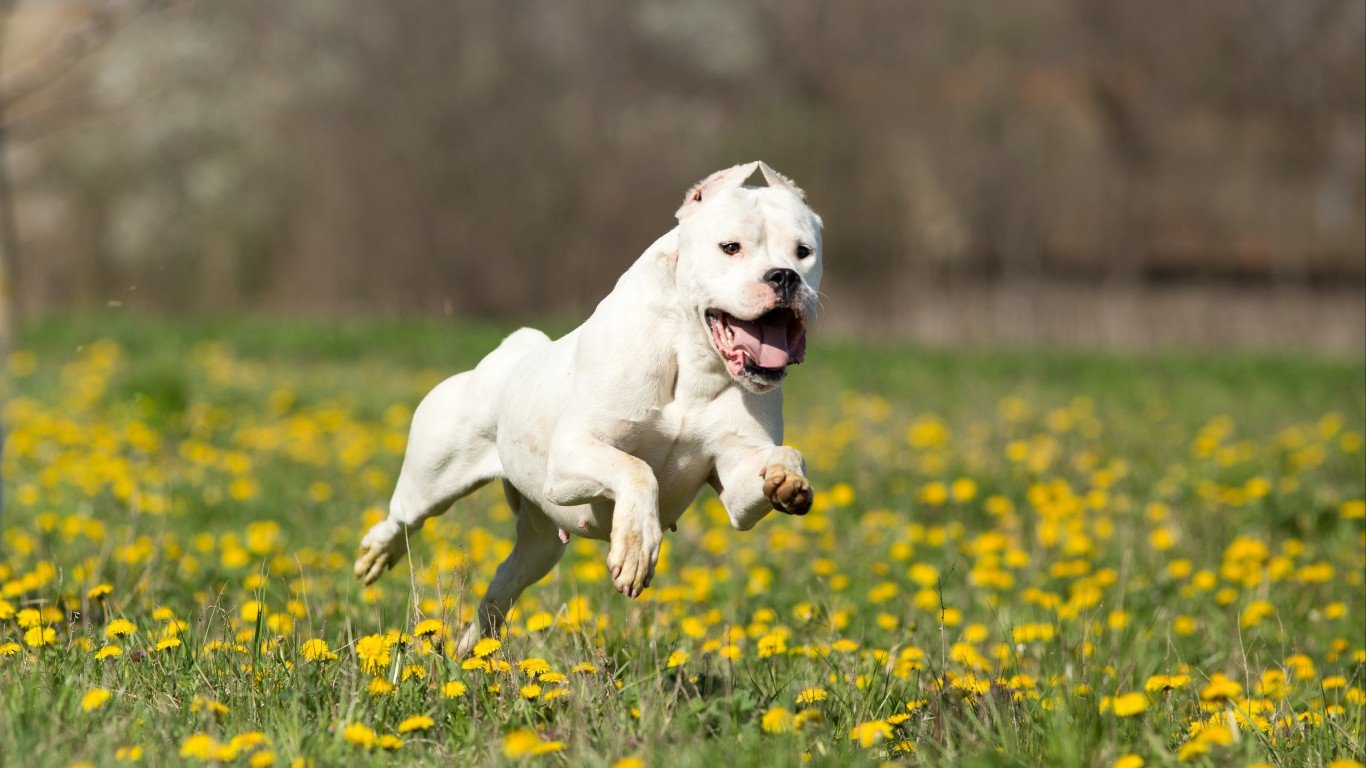 24/7 Wall St.
24/7 Wall St.